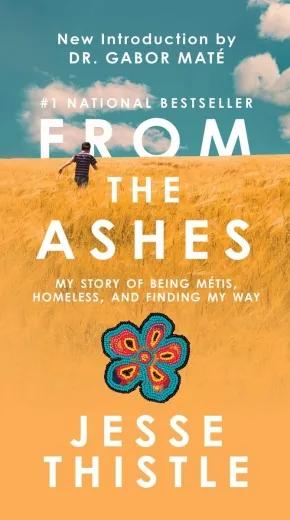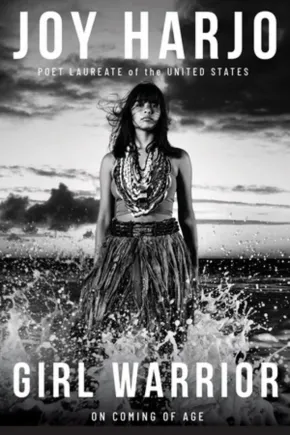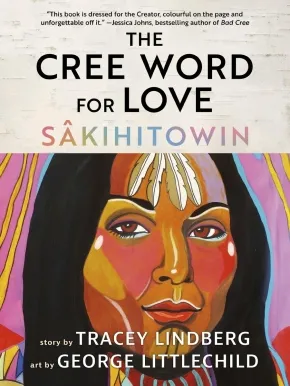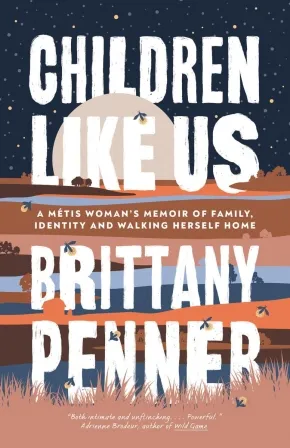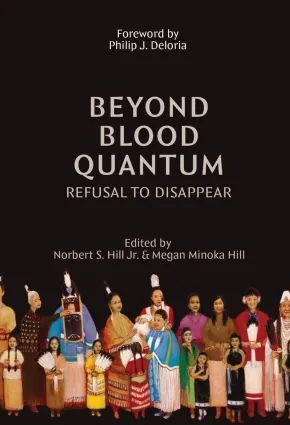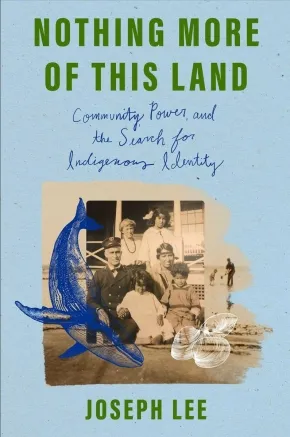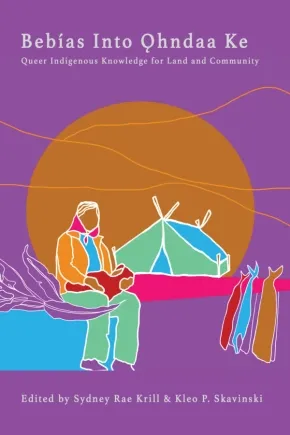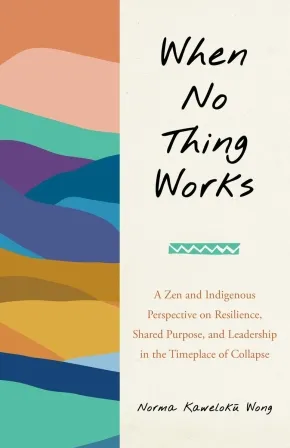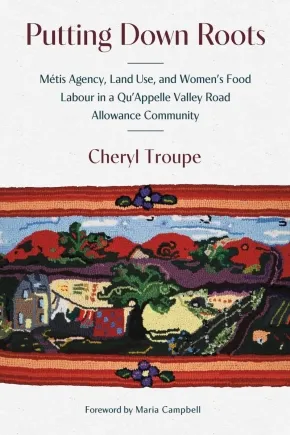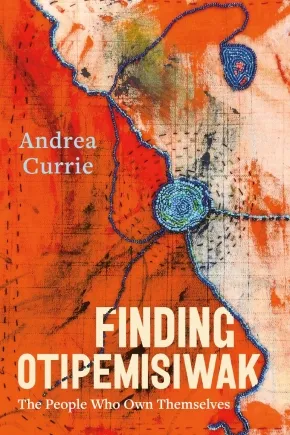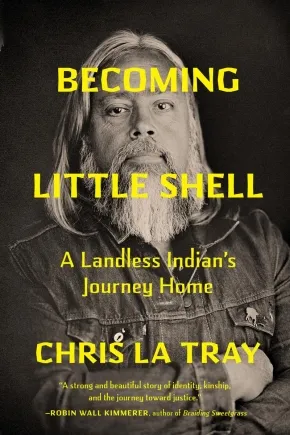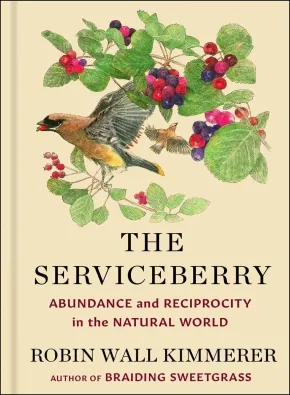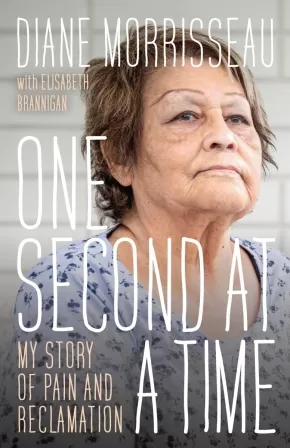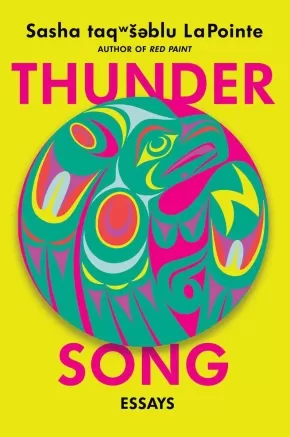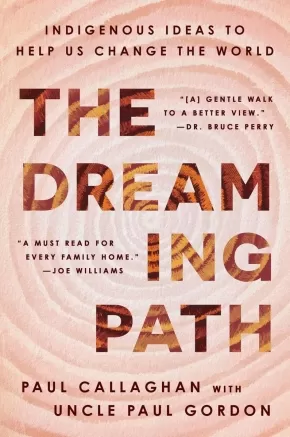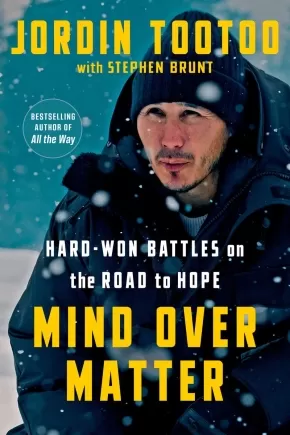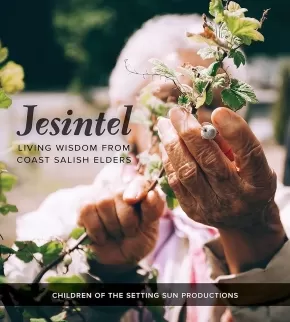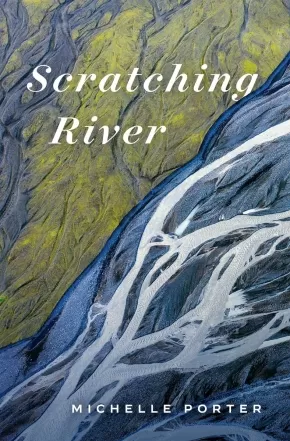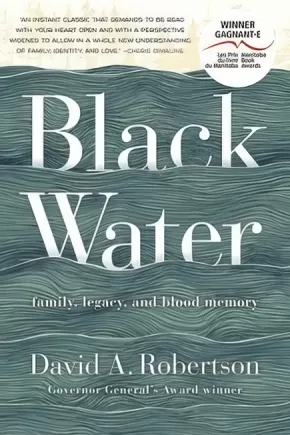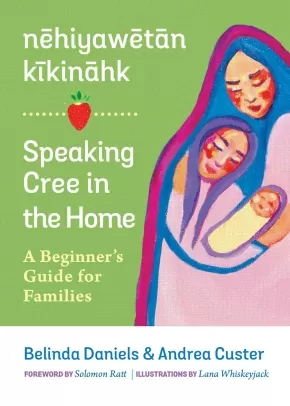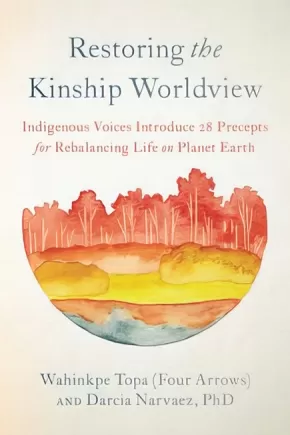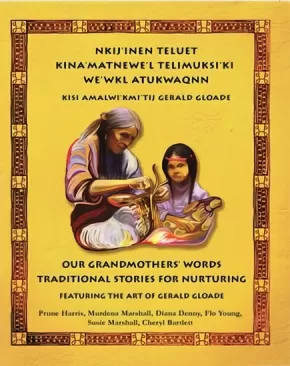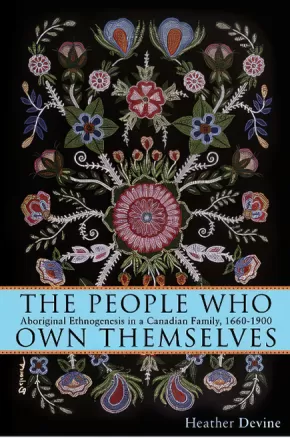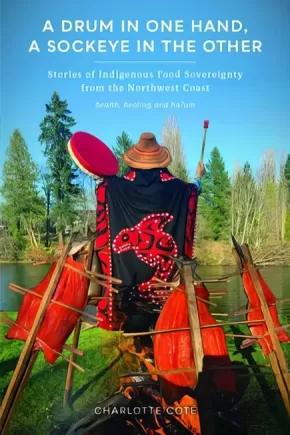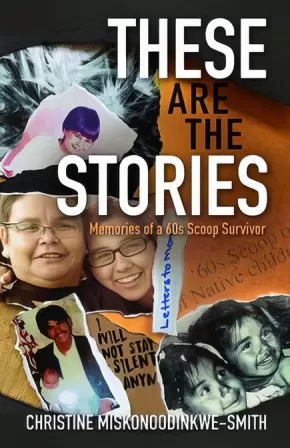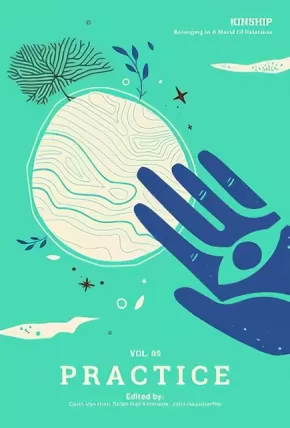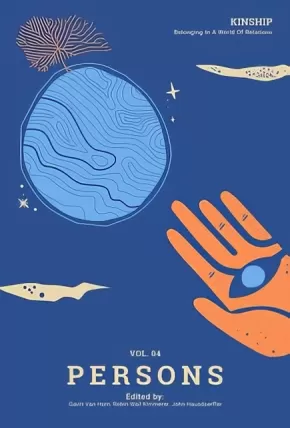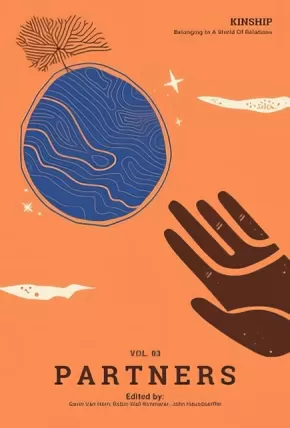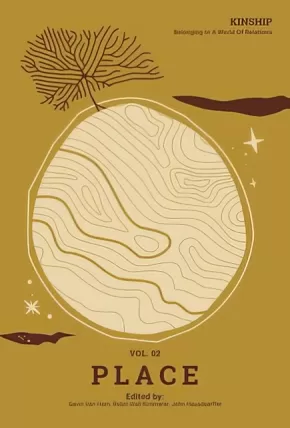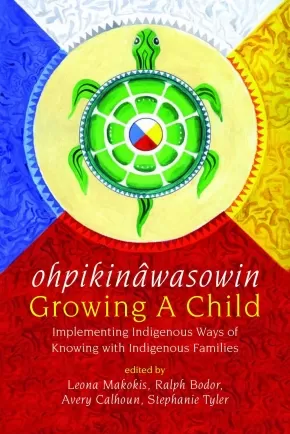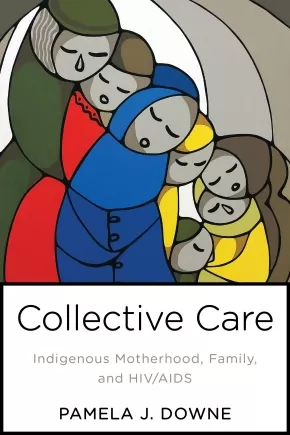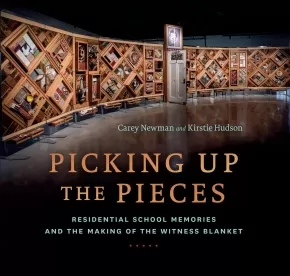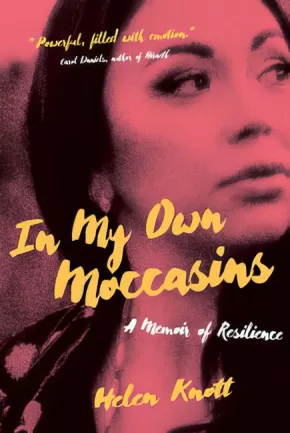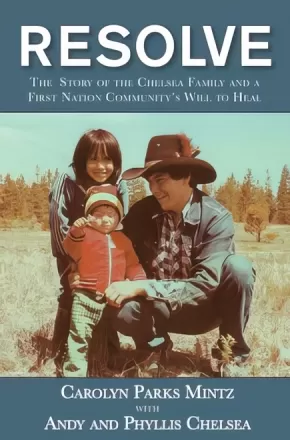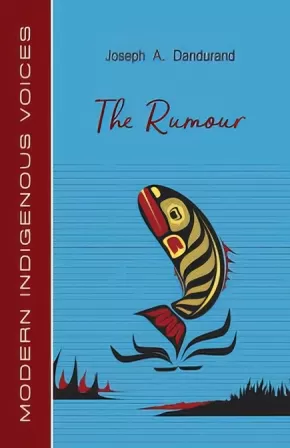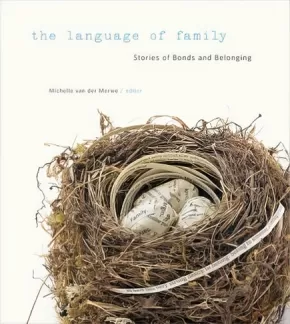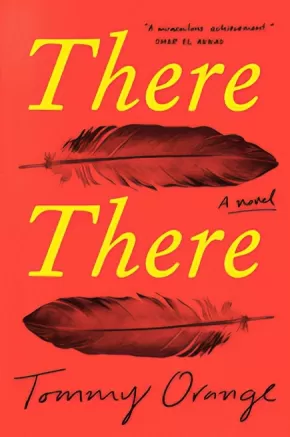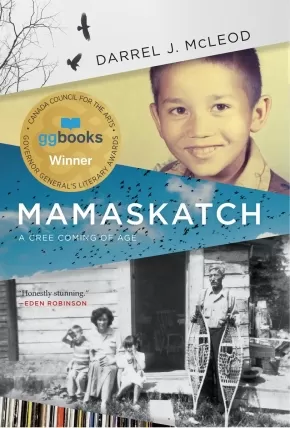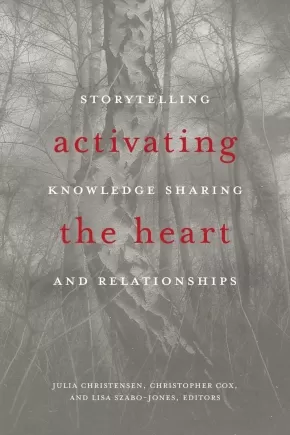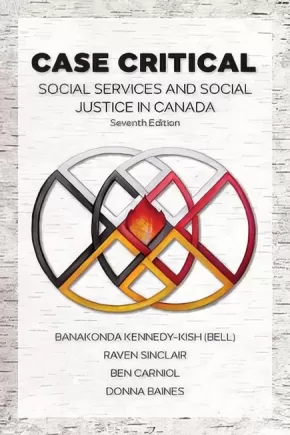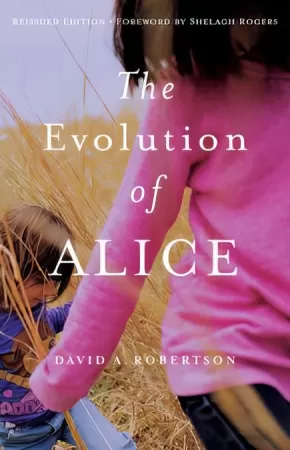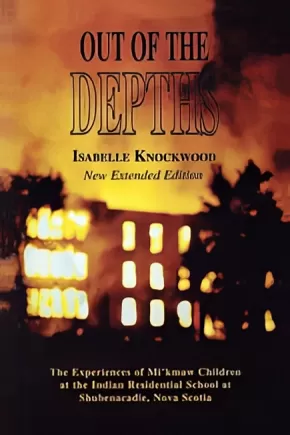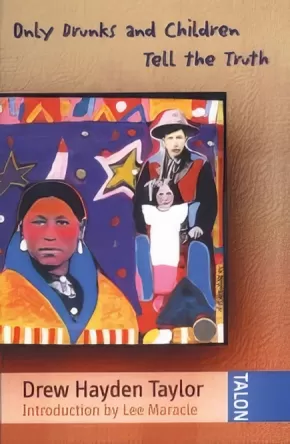
Family and Community
1
-
15
of
49 Results;
Sort By
Go To
of 4
From the Ashes: My Story of Being Métis, Homeless, and Finding My Way (PB)
$13.99
Format:
Paperback
Text Content Territories:
Indigenous Canadian; First Nations; Cree (Nehiyawak); Métis;
Reading Level: N/A
ISBN / Barcode: 9781668213728
Synopsis:
Synopsis:
In this extraordinary and inspiring debut memoir, Jesse Thistle, once a high school dropout and now a rising Indigenous scholar, chronicles his life on the streets and how he overcame trauma and addiction to discover the truth about who he is.
If I can just make it to the next minute... then I might have a chance to live; I might have a chance to be something more than just a struggling crackhead.
From the Ashes is a remarkable memoir about hope and resilience, and a revelatory look into the life of a Métis-Cree man who refused to give up.
Abandoned by his parents as a toddler, Jesse Thistle briefly found himself in the foster-care system with his two brothers, cut off from all they had known. Eventually the children landed in the home of their paternal grandparents, but their tough-love attitudes meant conflicts became commonplace. And the ghost of Jesse’s drug-addicted father haunted the halls of the house and the memories of every family member. Struggling, Jesse succumbed to a self-destructive cycle of drug and alcohol addiction and petty crime, spending more than a decade on and off the streets, often homeless. One day, he finally realized he would die unless he turned his life around.
In this heartwarming and heartbreaking memoir, Jesse Thistle writes honestly and fearlessly about his painful experiences with abuse, uncovering the truth about his parents, and how he found his way back into the circle of his Indigenous culture and family through education.
An eloquent exploration of what it means to live in a world surrounded by prejudice and racism and to be cast adrift, From the Ashes is, in the end, about how love and support can help one find happiness despite the odds.
Awards
- 2020 Indigenous Voices Awards Winner for Published Prose in English
- Winner, Kobo Emerging Writer Prize Nonfiction
- Winner, High Plains Book Awards
- An Indigo Book of the Year
Reviews
“From the Ashes hits you like a punch in the gut. It’s an unflinching, heartrending and beautifully written story of survival against seemingly impossible odds. But it’s also a book that should make you furious. Thistle paints a vivid portrait of a country seemingly incapable of doing right by Indigenous youth or by those struggling with homelessness, addiction and intergenerational trauma. That he survived to tell this story is truly a miracle. Still, one question haunts me after finishing this powerful and devastating book: How do we ensure that the next generation isn’t forced to navigate a broken system that takes their lives for granted and fails them at every turn? My greatest hope, then, is that From the Ashes will be the wakeup call Canada needs.” — IAN MOSBY, historian and author of Food Will Win the War
Educator Information
Caution: Deals with mature subject matter.
Additional Information
368 pages | 6.00" x 9.00"
Girl Warrior: On Coming of Age
$28.99
Format:
Hardcover
Text Content Territories:
Indigenous American; Native American; Muscogee (Creek);
Reading Level: N/A
ISBN / Barcode: 9781324094173
Synopsis:
Synopsis:
“To know ourselves is the most profound and difficult endeavor. Though we are all made of the same questions, we have individual routes to the answers, or to reframing the questions. Why is there evil in the world? Why do people suffer, and some more than others? Why are we here? What are we doing here? What happens after death? Does anything mean anything at all? Who am I and what does it matter?” writes Joy Harjo, renowned poet and activist, in this profound work about the struggles, challenges, and joys of coming of age.
In her best-selling memoir Poet Warrior, Harjo led readers through her lifelong process of artistic evolution. In Girl Warrior, she speaks directly to Native girls and women, sharing stories about her own coming of age to bring renewed attention to the pivotal moments of becoming including forgiveness, failure, falling, rising up, and honoring our vast family of beings.
Informed by her own experiences and those of her ancestors, Harjo offers inspiration and insight for navigating the many challenges of maturation. She grapples with parents, friendships, love, and loss. She guides young readers toward painting, poetry, and music as powerful tools for developing their own ethical sensibility. As Harjo demonstrates, the act of making is an essential part of who we are, a means of inviting the past into the present and a critical tool young women can use to shape a more just future. Lyrical and compassionate, Harjo’s call for creativity and empathy is an urgent and necessary work.
Reviews
"Joy Harjo combines the wisdom that was here long before Europeans showed up with the challenges of a woman’s life in the present. The result is inspired by the past and a personal preparation for the future."— Gloria Steinem, feminist activist and author
"What a beautiful and brilliant call to arms. I wish I had Joy Harjo’s words when I was young. This book is a lovely ode to her own bravery and by extension, all of ours. Girl Warrior gives possibility to young people (and all people) through Joy Harjo’s own coming-of-age narrative. More than about having waded through tumultuous waters and survived to not only tell the story but thrive inside the people we become on the other side. This book is simply a balm."— Jacqueline Woodson, National Book Award winner
Additional Information
176 pages | 5.37" x 8.00" | Hardcover
The Cree Word for Love: Sâkihitowin
$34.99
Artists:
Format:
Hardcover
Text Content Territories:
Indigenous Canadian; First Nations; Cree (Nehiyawak);
Reading Level: N/A
ISBN / Barcode: 9781443467780
Synopsis:
Synopsis:
Bestselling author of Birdie, Tracey Lindberg, and renowned artist George Littlechild join together in a stunning collaboration of story and art to explore love in all its forms—romantic, familial, community and kin—in the Cree experience.
In The Cree Word for Love, author Tracey Lindberg and artist George Littlechild consider a teaching from an Elder that in their culture, the notion of love as constructed in Western society does not exist. Here, through original fiction and select iconic paintings, Lindberg and Littlechild respond.
Together they have created and curated this collaboration which travels, season by season, mirroring the four rounds in ceremony, through the themes of the love within a family, ties of kinship, desire for romantic love and connection, strength in the face of loss and violence, and importance of self-love, as well as, crucially, a deeper exploration of the meaning of “all my relations.”
Together, art and story inspire and move readers to recall our responsibilities to our human and more than human relations, to think about the obligation that is love, and to imagine what it could possibly mean to have no Cree word for love. The result is a powerful story about where we find connection, strength, and the many forms of what it means to live lovingly.
Additional Information
224 pages | 6.00" x 8.00" | 20 full-color photos of paintings | Hardcover
Children Like Us: A Métis Woman's Memoir of Family, Identity and Walking Herself Home
$26.00
Format:
Paperback
Text Content Territories:
Indigenous Canadian; Métis;
Reading Level: N/A
ISBN / Barcode: 9780385688000
Synopsis:
Synopsis:
A Métis girl is adopted by a Mennonite family in this breathtaking memoir about family lost and found—for those who loved From the Ashes and Educated.
By the time Brittany Penner is seven years old, she has loved and lost twenty-one foster siblings who have come into her family and left—all of them Indigenous like her. "When will it be my turn?" she asks her mother time and time again. "When will I be taken away?" You won't be, she is told. You're adopted. You're here to stay. You're the lucky one.
On the day of her birth in 1989, near the end of the Sixties Scoop, Brittany was relinquished into the care of the government and adopted by a white Mennonite family in a small prairie town. Her name and where she came from are hidden from her; all she is told is that she is Métis. Her childhood is shaped by church, family, service and silence. Her family is continuously shifting as siblings arrive and depart, one by one. She knows that to stay, she has to force herself into the mold created for her. She must be obedient. Quiet. Good. No matter what.
Whenever she looks in the mirror, she searches her features, wondering if they've been passed down to her by her biological mother. She thinks, if she can find her mother, she'll find all the answers she's looking for. As Brittany moves into adulthood, she will uncover answers—but they will be more tangled than she could have imagined.
Children Like Us asks difficult questions about family, identity, belonging and cultural continuity. What happens when you find what you're looking for, but it can't offer you everything you need? How do you reckon with the truth of your own story when you've always been told you're lucky and should be grateful? What does it mean to belong when you feel torn between cultures? And how does a person learn to hold the pain and the grief, as well as the triumphs, the joys and the beauty, allowing none to eclipse the others?
Reviews
"Children Like Us is a luminous memoir about identity, loss and belonging. Adopted at birth by a white Mennonite family, Brittany Penner grows up straddling two worlds—one she knows and one that remains just out of reach. As she pieces together her origins, she reckons with the complexities of family, love and cultural displacement. Both intimate and unflinching, Children Like Us is a powerful exploration of what it means to know where you come from—and what it costs when that knowledge is withheld." —Adrienne Brodeur, nationally bestselling author of Wild Game
"An absolutely mesmerizing debut. It was a privilege to bear witness to Brittany Penner's story about intergenerational trauma, identity, and belonging. The kinds of complicated grief we so often experience in life are born out of the complexity of human relationships and our fierce ability to both hurt and heal one another. Penner explores this truth deftly, with wisdom, compassion and grace. I hope everyone reads this book." —Claire Bidwell Smith, author of The Rules of Inheritance
Additional Information
384 pages | 5.62" x 8.25" | Paperback
Beyond Blood Quantum: Refusal to Disappear
$33.95
Format:
Paperback
Text Content Territories:
Indigenous American;
Reading Level: N/A
ISBN / Barcode: 9781682754627
Synopsis:
Synopsis:
In Beyond Blood Quantum, voices from Indian Country convey the insidious impacts of the Indian Reorganization Act confronting the existential and pragmatic questions facing many Native Nations to determine who is—and who is not—a citizen. The voices of poets, parents, academics, activists, educators, young adults, and elders prompt conversations in consideration of shared cultural values and lived realities outside of the limited confines of blood quantum.
Both informational and poetic, Beyond Blood Quantum: Refusal to Disappear is a guide for conversation in-community and a songline of voices grappling with contemporary Native identity and the sovereignty inherent in defining citizenship with analysis softened by appreciation for kin, land, and promises to future generations from the descendants of generations who continue to resist, who refuse to disappear.
Reviews
“The tough issues of Native American identity come from within our communities as well as the harmful legacy of oppressive federal Indian policy. From the rise in “pretendians” to the fetishization of Native culture, contributors allow readers to explore the complexities of what it means to belong to a Tribe/Native Nation, according to their own customs and governance." —Karen Diver, Senior Advisor to the President for Native American Affairs at the University of Minnesota, Former Chairwoman, Fond du Lac Band of Lake Superior Chippewa, and Former Special Assistant to President Obama for Native American Affairs
"Our elders teach us that no man, or government, not even the most powerful nation in the world can take away all that defines who we are as Indigenous people—that the Creator gifted to our foremothers and forefathers at the time of Creation—but ourselves. They say that if we are not mindful of our past experiences of our foremothers and forefathers surviving every conceivable policy and laws imposed upon our people, generation after generation, we can at some point in our journey be capable of becoming our own worst enemy. When we internalize the oppression as exhibited by this nation upon our people, and internalize that oppression, we can become the oppressors. The elders warn and prophesied that when that happens, it will be the beginning of the end of us. It is deviating from our core values as gifted to us by our Creator as the deepest expression of love for us. Blood quantum is the epitome of this departure from the Original Instructions of embracing all sacred beings that our children represent so that our lifeways will continue and thrive. The elders say, they are the sacred beings, gifts from the Creator so that we shall continue as a People. The use of blood, our lifeline, to define our relations and our connections ironically in this time of self determination could be the cause of our end. What the government designed, we shall complete. This cannot be the end of our journey.” —Regis Pecos
“A testament to the refusal to disappear and inherent Indigenous sovereignty, Beyond Blood Quantum offers profound insights and reflections on the path forward.” —Wayne Ducheneaux
“Tribal citizens must become informed of where we are and where we are going on the explosive issue of blood quantum. The chapters in this book are a tool for self-education and constitute possible road maps for the future of Indian nations.”—Henrietta Mann
“Blood quantum is an issue that all tribes need to be aware of as they exercise their sovereign right to set their membership standards.” —John Echohawk
Additional Information
288 pages | 6.00" x 9.00" | Paperback
Nothing More of This Land: Community, Power, and the Search for Indigenous Identity
$38.99
Format:
Hardcover
Text Content Territories:
Indigenous American; Native American; Wampanoag (Wôpanâak); Aquinnah Wampanoag;
Reading Level: N/A
ISBN / Barcode: 9781668087251
Synopsis:
Synopsis:
From award-winning journalist Joseph Lee, a sweeping, personal exploration of Indigenous identity and the challenges facing Indigenous people around the world.
Before Martha’s Vineyard became one of the most iconic vacation destinations in the country, it was home to the Wampanoag people. Today, as tourists flock to the idyllic beaches, the island has become increasingly unaffordable for tribal members, with nearly three-quarters now living off-island. Growing up Aquinnah Wampanoag, journalist Joseph Lee grappled with what this situation meant for his tribe, how the community can continue to grow, and more broadly, what it means to be Indigenous.
In Nothing More of This Land, Lee weaves his own story and that of his family into a panoramic narrative of Indigenous life around the world. He takes us from the beaches of Martha’s Vineyard to the icy Alaskan tundra, the smoky forests of Northern California to the halls of the United Nations, and beyond. Along the way he meets activists fighting to protect their land, families clashing with their own tribal leaders, and communities working to reclaim tradition.
Together, these stories reject stereotypes to show the diversity of Indigenous people today and chart a way past the stubborn legacy of colonialism.
Reviews
"Nothing More Of This Land is a stark, beautifully rendered reminder of all that had to occur for the happening of our existences to take place, and all who lived and fought against their own erasure to maintain a semblance of a legacy. This is a profound, and moving book, a powerful indictment of the colonial mindset that firmly balances an ode to people, to place, to remaining."—Hanif Abdurraqib, author of There's Always This Year
"A forcefully illuminating and utterly compelling blend of personal narrative and vivid reportage, Joseph Lee’s Nothing More of this Land is a triumph of complexity and insight. We follow Lee from the red clay cliffs of Aquinnah to the halls of the UN, from the Klamath River basin to a feast of muktuk and tundra greens in Bethel, Alaska; and very early on I realized I’d follow him anywhere. Lee has given us a timely reckoning with Native sovereignty and community that is adroitly committed to the mess and nuance of lived experience, rather than sentimentalized accounts of victimhood or resilience. Nothing More of this Land is tender, ferocious, surprising, and tenaciously thoughtful; its existence makes the world a bigger and truer place."—Leslie Jamison, bestselling author of The Empathy Exams
Additional Information
256 pages | 6.00" x 9.00" | Hardcover
Bebías Into Ǫhndaa Ke: Queer Indigenous Knowledge for Land and Community
$28.00
Editors:
Format:
Paperback
Text Content Territories:
Indigenous Canadian;
Reading Level: N/A
ISBN / Barcode: 9781927886922
Synopsis:
Synopsis:
Bebías Into Ǫhndaa Ke: Queer Indigenous Knowledge for Land and Community is a powerful collection of essays, stories and conversations that provide us with a diverse roadmap for navigating and overcoming hate, supporting queer Indigenous kin, and revitalizing radical ethics of care for building healthy, inclusive, and self-determining lands and communities. A celebration of trans, queer, and Two-Spirit Indigenous brilliance, with an intentional inclusion of voices from the North (the Yukon, Northwest Territories, Inuvialuit and Nunatsiavut), the essays in this collection offer a wealth of queer Indigenous theory, experience, and practices, with a unique emphasis on the critical role of land in these conversations.
The contributors, who range from young activists, artists, families, and both emerging and established scholars, provide insightful and transformative queer perspectives on a number of pertinent topics, including: knowledge reclamation, resurgence, nation-building, community life and governance, cultural revitalization, belonging, family relationships, creative practice, environmental degradation, mental health and wellbeing, youth empowerment, and Indigenous pedagogy. Amidst the ongoing violence of settler colonization, and its legacies of exclusion and erasure that continue to target queer, gender-diverse and Two-Spirit Indigenous people, this collection is an invaluable gift and resource for our communities, showing us that a different world is possible, and reminding us that queer Indigenous people have always belonged on the land and in community.
Additional Information
240 pages | 6.00" x 9.00" | Paperback
When No Thing Works: A Zen and Indigenous Perspective on Resilience, Shared Purpose, and Leadership in the Timeplace of Collapse
$24.95
Format:
Paperback
Text Content Territories:
Indigenous Polynesian; Indigenous Hawaiian;
Reading Level: N/A
ISBN / Barcode: 9798889840992
Synopsis:
Synopsis:
Spiritual and community lessons for embracing collective care, co-creating sustainable worlds, and responsibly meeting uncertain futures—a Zen and Indigenous take on building better, more balanced ways of being
Talking story, weaving poetry, and offering wisdom at the intersections of strategy, politics, and spiritual activism, When No Thing Works is a visionary guide to co-creating new worlds from one in crisis. It asks into the ways we can live well and maintain our wholeness in an era of collective acceleration: the swiftly moving current, fed and shaped by human actions, that sweeps us toward ever uncertain futures. Grounded in Zen Buddhism, interconnection, and decades of community activism, When No Thing Works explores questions like:
- As we stand at a threshold of collective change, what leaps must we make?
- How can we push through discord and polarization and meet these critical changepoints collectively?
- What practices, strategies, and spiritualities can align to vision a sustainable future for our communities and descendants?
- How can we step out of urgency to tend to our crises with wisdom, intention, and care?
With wise and witty prose that wanders and turns, guides and reveals, Zen master and Indigenous Hawaiian leader Rōshi Norma Wong’s meditation holds our collective moment with gravity and tender care. She asks us to not only imagine but to live into a story beyond crisis and collapse—one that expands to meet our dreams of what (we hope) comes next, while facing with clarity and grace our here and now in the world we share today.
Reviews
“Norma Ryuko Kawelokū Wong explores the essence of a twenty-first-century Indigenous worldview in When No Thing Works. She relies on knowing that all things, past and future, are in relationship. What we imagine and how we walk in the present determines the future. As Norma signals, our walk must include leaps that take us into unknowns, but we will not be alone. Norma gives us wise counsel for this difficult moment on Mother Earth. One culture, one belief system, one community alone is unable to fulfill our ancestors’ collective hopes for all of our descendants. As Norma’s ancestors said, ‘O ka ehu kakahiaka . . . The red dawn of our people became the red dawn of many peoples.’ Hawwih (thank you in Caddo), Norma, your family, and your people!”—Judith LeBlanc, citizen of the Caddo Nation, ekah (grandmother), and executive director of the Native Organizers Alliance
“As we stand at the threshold of collapsing systems and broken hearts, there is an opening. In When No Thing Works, Rōshi Norma Wong gives us a compass for how to navigate the space in between where we are coming from and where we are going. This book is an invitation to practice who we need to be to meet this moment and shape a future of possibility and potential.”—Kerri Kelly, author of American Detox
Additional Information
120 pages | 5.51" x 8.51" | 6 b&w photos | Paperback
Putting Down Roots: Métis Agency, Land Use, and Women's Food Labour in a Qu'Appelle Valley Road Allowance Community
$27.95
Format:
Paperback
Text Content Territories:
Indigenous Canadian; Métis;
Reading Level: N/A
ISBN / Barcode: 9781772841022
Synopsis:
Synopsis:
Mapping Métis history and cultural heritage through women's work.
Centring kinship and the strength of women, Putting Down Roots reframes Métis road allowance communities as sites of profound resistance and resilience, restoring Métis life in places, times, and scholarship where it has been obscured by settler narratives. These communities were not peripheral spaces where Métis lived as squatters, but places where families culturally thrived by visiting each other, telling stories, sharing food, and providing mutual aid. With stories of Métis li vyeu (Elders) as its foundation, this innovative study reveals the agency embedded in the everyday actions of women's work, which sustained Métis identity, family systems, and relationships to land.
Cheryl Troupe charts a century of Métis presence and persistence in the Qu'Appelle Valley, from the end of the buffalo hunt in the 1850s, through displacement following the northwest resistances, resettlement on fringe Crown lands, ongoing political activism and opposition to Canadian land-use practices, and finally the dissolution of the road allowance community along Katepwa Lake in the 1950s. Focusing on female kinship relationships and food production, Putting Down Roots illuminates the ways women created the stability necessary to adapt to the rapidly changing economic, social, and political conditions that defined this period of Canadian history.
Troupe's sophisticated use of oral histories, archival sources, genealogies, photographs, and deep mapping links people and their stories to the spaces that are important to them. Adding a new dimension to the study of Métis history, Putting Down Roots brings to life the tremendous cultural strength that characterized Métis road allowance communities.
Reviews
"Engaging and well-documented, Putting Down Roots details the economic production of Métis women and should serve to permanently dispel the trope that Métis men were the dominant breadwinners in their society. Compelling anecdotes provided through the collected oral histories clearly delineate the major role of Métis women in family and community formation."— Heather Devine
Educator Information
Table of Contents
List of Tables
List of Figures
Foreword
Acknowledgments
Introduction
Chapter 1. “Down there in the Valley”: Introducing Bob and Margaret
Chapter 2. Daughters of the Country: Women’s Labour in the Métis World
Chapter 3. Petitioning for Rights and Taking up Agriculture
Chapter 4. Asserting Sovereignty to Secure Land
Chapter 5. Securing Land Tenure: The North-West Half-Breed Scrip Commission and Homesteading
Chapter 6. “We Got Our House Built by Seneca Roots”: Life on the Road Allowance
Chapter 7. Going Hunting Rabbits: Women’s Labour in Feeding the Family
Chapter 8. Contesting Government Intervention into Harvesting Spaces
Chapter 9. “This is a Michif Road”: Métis Labour and Relief
Conclusion
Bibliography
Notes
Additional Information
408 pages | 6.00" x 9.00" | 29 b&w illustrations, 10 b&w tables, 14 maps, index, bibliography | Paperback
Finding Otipemisiwak: The People Who Own Themselves
$24.95
Format:
Paperback
Text Content Territories:
Indigenous Canadian; Métis;
Reading Level: N/A
ISBN / Barcode: 9781551529554
Synopsis:
"Weaving myriad forms - poetry, family history, personal essay, cultural criticism - Andrea Currie tells her story with mercy and force, revealing the warp and weft of the racist system that codified the robbery of Indigenous children through the Sixties Scoop and the devastating consequences for those children, their families, and their communities. In this rigorous and beautiful debut, Currie's unfaltering pursuit of complicated truths lifts into the light the possibility of healing, as she seeks and finds her own lost family, writing her story into theirs. Finding Otipemisiwak is a necessary, searing, and luminous gift of a book." —Rebecca Silver Slayter, author of The Second History
Synopsis:
A Sixties Scoop survivor's journey back to her Nation and the truth of who she is
Otipemisiwak is a Plains Cree word describing the Metis, meaning "the people who own themselves."
Andrea Currie was born into a Metis family with a strong lineage of warriors, land protectors, writers, artists, and musicians - all of which was lost to her when she was adopted as an infant into a white family with no connection to her people. It was 1960, and the Sixties Scoop was in full swing. Together with her younger adopted brother, also Metis, she struggled through her childhood, never feeling like she belonged in that world. When their adoptions fell apart during their teen years, the two siblings found themselves on different paths, yet they stayed connected. Currie takes us through her journey, from the harrowing time of bone-deep disconnection, to the years of searching and self-discovery, into the joys and sorrows of reuniting with her birth family.
Finding Otipemisiwak weaves lyrical prose, poetry, and essays into an incisive commentary on the vulnerability of Indigenous children in a white supremacist child welfare system, the devastation of cultural loss, and the rocky road some people must walk to get to the truth of who they are. Her triumph over the state's attempts to erase her as an Indigenous person is tempered by the often painful complexities of re-entering her cultural community while bearing the mark of the white world in which she was raised. In Finding Otipemisiwak, one woman's stories about surviving, then thriving as a fully present member of her Nation and the human family are a portal. Readers who walk through will better understand the impact of the Sixties Scoop in the country now called Canada.
Reviews
"Finding Otipemisiwak is a stunning, illuminating, and gutting journey through the life of a Sixties Scoop survivor. Page turning, genre bending, personal and political, staggeringly honest, heartbreaking, and glorious, it is a story of resistance, possibility, healing, and hope, of reclamation and reconciliation. With words to stop you in your tracks, Currie braids together heart, soul, and smarts in memoir, poems, threads of her family histories, the Red and Assiniboine Rivers, unflinching questions, and courage, making herself magnificently vulnerable. This book cuts to the heart of the Sixties Scoop crisis, addresses the intergenerational trauma of not only its survivors but its effects on all of us. It gives us all a chance to relearn the history of Canada and to dream of a healing in it. It is part of the truth-telling change this country so desperately needs." — Camille Fouillard, author of Precious Little
"Finding Otipemisiwak is a beautifully written story of tragedy and triumph, as well as one of escape from a false family into the embrace of a loving one. Threading through Currie's remarkable tale is a heart-wrenching bond between her and her adoptive brother, Rob. This book contains a story that desperately needs to be told." —Frank Macdonald, author of A Forest for Calum
"This book takes on the quality of a great radio documentary, splicing prose, poetry, and actuality as Andrea Currie cross-examines colonization and the story that settler society placed over her like a net. When she comes to know who she and her people are, there is joy and there is sadness, but also truth and belonging, a firm scaffolding as Andrea comes to own herself. Finding Otipemisiwak is a powerful act of resistance and gripping to read. It is a balm. —Shelagh Rogers, founding host and co-creator of The Next Chapter CBC Radio
"Finding Otipemisiwak is a poignant story of self-discovery, weaving Red River Metis heritage with personal narrative and ancestral lore and honouring resilience amidst the Sixties Scoop." —Albert G.D. Beck, Director, Manitoba Metis Federation
"Weaving myriad forms - poetry, family history, personal essay, cultural criticism - Andrea Currie tells her story with mercy and force, revealing the warp and weft of the racist system that codified the robbery of Indigenous children through the Sixties Scoop and the devastating consequences for those children, their families, and their communities. In this rigorous and beautiful debut, Currie's unfaltering pursuit of complicated truths lifts into the light the possibility of healing, as she seeks and finds her own lost family, writing her story into theirs. Finding Otipemisiwak is a necessary, searing, and luminous gift of a book." —Rebecca Silver Slayter, author of The Second History
Additional Information
272 pages | 6.00" x 9.00" | Paperback
Becoming Little Shell: A Landless Indian's Journey Home
$42.95
Format:
Hardcover
Text Content Territories:
Indigenous American; Native American; Anishinaabeg; Ojibwe (Chippewa); Little Shell Tribe of Chippewa Indians ;
Reading Level: N/A
ISBN / Barcode: 9781571313980
Synopsis:
Synopsis:
Growing up in Montana, Chris La Tray always identified as Indian. Despite the fact that his father fiercely denied any connection, he found Indigenous people alluring, often recalling his grandmother’s consistent mention of their Chippewa heritage.
When La Tray attended his grandfather’s funeral as a young man, he finally found himself surrounded by relatives who obviously were Indigenous. “Who were they?” he wondered, and “Why was I never allowed to know them?” Combining diligent research and compelling conversations with authors, activists, elders, and historians, La Tray embarks on a journey into his family’s past, discovering along the way a larger story of the complicated history of Indigenous communities—as well as the devastating effects of colonialism that continue to ripple through surviving generations. And as he comes to embrace his full identity, he eventually seeks enrollment with the Little Shell Tribe of Chippewa Indians, joining their 158-year-long struggle for federal recognition.
Both personal and historical, Becoming Little Shell is a testament to the power of storytelling, to family and legacy, and to finding home. Infused with candor, heart, wisdom, and an abiding love for a place and a people, Chris La Tray’s remarkable journey is both revelatory and redemptive.
Reviews
“La Tray’s pride and conviction will have readers eager not only to learn more, but to take action. A brilliant contribution to the canon of Native American literature.”—Kirkus Reviews, starred review
“[A] gripping debut memoir. [. . .] La Tray’s crystalline prose and palpable passion for spreading Indigenous history bolster his account. Readers will be fascinated.”—Publishers Weekly
"Heartbreaking, infuriating, and remarkable, Becoming Little Shell is a memoir that’s packed with historical details,transcending and amplifying a personal quest to understand a family’s past."—Foreword Reviews, starred review
“Smart, emotional, and bracingly honest, La Tray is a powerful storyteller who should have significant appeal.”—Booklist
“I’m in awe of Chris La Tray’s storytelling. Becoming Little Shell creates a multilayered narrative from threads of personal, family, community, tribal, and national histories. Together they make a story as strong and beautiful as a Metis sash—a story of identity, kinship, and the journey toward justice.”—Robin Wall Kimmerer, author of Braiding Sweetgrass
“Chris La Tray is a powerful voice—a force of nature, really—to guide us through the swirling confluence of Native and white worlds, both past and present. Becoming Little Shell is the American story of our era—tracing the arc of its author brought up in the white world before discovering his roots as an original inhabitant of this continent.”—Peter Stark, author of Gallop Toward the Sun
“Indigenous identity can be complicated, and Becoming Little Shell compels us into the thick of it—Native people dispossessed of not just land but recognition; blood quantum laws originally crafted to complete a genocide and still wreaking havoc in identity debates today; racism that drove many Native people to disassociate from their families; and descendants, like La Tray, who have found their way back, fighting for the reconnection of their communities and for the observance of their very existence. La Tray is a loving, discerning, curious, funny, and generous guide. This is a beautiful, big-hearted book.”—Sierra Crane Murdoch, author of Yellow Bird
“Becoming Little Shell is a moving, deeply felt, and incredibly detailed account of Chris La Tray’s search for his origins among the Métis, Pembina, and Little Shell Tribe of Chippewa Indians. Combining memoir, history, interviews, and travel, La Tray gives us nothing less than the history of a people in the form of an absorbing and emotionally searing memoir. This book will, without a doubt, become a classic in Native American literature. Must read.”—David Treuer, author of The Heartbeat of Wounded Knee
“What I appreciate so much about Chris La Tray’s writing on Indigenous identity and history is the wit, clarity, and integrity embodied in every word. Becoming Little Shell beautifully encompasses a journey that we can all learn from, a journey toward asking better questions about land, belonging, and connection, and through this book La Tray epitomizes historian, poet, and teacher. Full of Indigenous history, personal stories, and the complex dance between the two, La Tray reminds us that the journey of finding ourselves and making sense of the way colonialism plays out around us is an essential part of being human. Please read this book. You’ll be so glad you did.”—Kaitlin B. Curtice, author of Living Resistance
Additional Information
320 pages | 6.00" x 9.00" | Hardcover
The Serviceberry: Abundance and Reciprocity in the Natural World
$25.00
Format:
Hardcover
Text Content Territories:
Indigenous American;
ISBN / Barcode: 9781668072240
Synopsis:
Synopsis:
From the #1 New York Times bestselling author of Braiding Sweetgrass, a bold and inspiring vision for how to orient our lives around gratitude, reciprocity, and community, based on the lessons of the natural world.
As Indigenous scientist and author of Braiding Sweetgrass Robin Wall Kimmerer harvests serviceberries alongside the birds, she considers the ethic of reciprocity that lies at the heart of the gift economy. How, she asks, can we learn from Indigenous wisdom and the plant world to reimagine what we value most? Our economy is rooted in scarcity, competition, and the hoarding of resources, and we have surrendered our values to a system that actively harms what we love. Meanwhile, the serviceberry’s relationship with the natural world is an embodiment of reciprocity, interconnectedness, and gratitude. The tree distributes its wealth—its abundance of sweet, juicy berries—to meet the needs of its natural community. And this distribution insures its own survival. As Kimmerer explains, “Serviceberries show us another model, one based upon reciprocity, where wealth comes from the quality of your relationships, not from the illusion of self-sufficiency.”
As Elizabeth Gilbert writes, Robin Wall Kimmerer is “a great teacher, and her words are a hymn of love to the world.” The Serviceberry is an antidote to the broken relationships and misguided goals of our times, and a reminder that “hoarding won’t save us, all flourishing is mutual.”
Reviews
“Robin Wall Kimmerer is writer of rare grace. She writes about the natural world from a place of such abundant passion that one can never quite see the world the same way after having seen it through Kimmerer’s eyes. In Braiding Sweetgrass, she takes us on a journey that is every bit as mythic as it is scientific, as sacred as it is historical, as clever as it is wise. She is a great teacher, and her words are a hymn of love to the world.” —Elizabeth Gilbert
“Robin Wall Kimmerer has written an extraordinary book, showing how the factual, objective approach of science can be enriched by the ancient knowledge of the indigenous people. It is the way she captures beauty that I love the most—the images of giant cedars and wild strawberries, a forest in the rain and a meadow of fragrant sweetgrass will stay with you long after you read the last page.” —Jane Goodall
“I give daily thanks for Robin Wall Kimmerer for being a font of endless knowledge, both mental and spiritual.”—Richard Powers, The New York Times
“Robin Wall Kimmerer opens a sense of wonder and humility for the intelligence in all kinds of life we are used to naming and imagining as inanimate.” —Krista Tippett, host of On Being
Additional Information
112 pages | 5.00" x 7.00" | Hardcover
Métis Matriarchs: Agents of Transition
$34.95
Editors:
Format:
Paperback
Text Content Territories:
Indigenous Canadian; Métis;
Reading Level: N/A
ISBN / Barcode: 9781779400116
Synopsis:
Synopsis:
Explores the integral roles that Métis women assumed to ensure the survival of their communities during the fur trade era and onward
Métis Matriarchs examines the roles of prominent Métis women from across Western Canada from the late 19th to the mid-20th century, providing a rare glimpse into the everyday lives of these remarkable women who were recognized as Matriarchs and respected for their knowledge, expertise, and authority within their families and communities.
This edited collection provides an opportunity to learn about the significant contributions made by Métis women during a transitional period in Western Canadian history as the fur trade gave way to a more sedentary, industrialized, and agrarian economy. Challenging how we think about Western Canadian settlement processes that removed Indigenous peoples from the land, this collection of stories examines the ways Métis matriarchs responded to colonial and settler colonial interventions into their lives and livelihoods and ultimately ensured the cultural survival of their communities.
Awards
- 2025 Canadian Historical Association Indigenous History Book Prize
Reviews
“A nuanced account of the lives of Métis women and their vital roles as they helped guide their families and communities through generations of transitions.” —Michel Hogue, author of Metis and the Medicine Line
Additional Information
336 pages | 5.00" x 8.00"| Paperback
One Second at a Time: My Story of Pain and Reclamation
$24.95
Format:
Paperback
Text Content Territories:
Indigenous Canadian; First Nations; Anishinaabeg; Sagkeeng;
Reading Level: N/A
ISBN / Barcode: 9780774880978
Synopsis:
Synopsis:
Bullied and abused at the Fort Alexander Indian Residential day school, Diane Morrisseau fought back and left school at the age of fifteen. Despite her strength, a childhood of trauma and abuse led her into the arms of Edgar Olson, and by sixteen, the young Ojibway-Anishinabe woman had given birth to her first child and married the man who would become her tormentor for the next eighteen years.
For almost two decades, Diane Morrisseau was chained to a brutal husband who abused not only her, but their children. By threatening Diane with their death and hers should she ever try to leave, he ensured that she would continue to endure his cruelty. Notoriously violent, her abuser was aided and abetted by the systems of colonialism that failed to protect Diane during her childhood. Edgar was able to keep Diane and her children trapped in a cycle of violence for years, without being held accountable by law or society.
Despite this, Diane found the strength to walk away. This book is the story of how she did so, and how she rebuilt a life beyond her abuser. Through Al-Anon, Anishinabe traditional healing ceremonies, counselling, and care for others, Diane found a new path illuminated by compassion and purpose.
Diane Morrisseau recounts her traumatic history with one aim: to help other victims of violence know they are not alone, and that escape is possible. The author’s entire career, and this book, testify to her desire to extend to others the hope that eluded her in the depths of her desperate circumstances.
Devastatingly frank about the abuse she suffered, the mothering her children missed because of it, and the systems that allowed it all to happen, Diane today has reconciled the past with a present where she continues to live out the values that matter to her most.
All royalties from sales of this book will be donated to Archway Community Services.
The story of an Ojibway-Anishinabe woman who, against incredible odds, rescued herself and her children from a life of brutal beatings, sexual servitude, and almost unimaginable hardship.
Reviews
"Selected as one of the most anticipated feminist books of 2024."— Ms. Magazine
"A courageous and harrowing story. Morrisseau uses her painful personal journey to frame the horrific history of residential schools. Evocative and illuminating."
— Angela Sterritt, author of Unbroken: My Fight for Survival, Hope, and Justice for Indigenous Women and Girls
"I is, in many ways, a difficult story to read – but it is one that needs to be told. Readers will learn about a courageous woman and the circumstances that enabled an abusive relationship, and hear her message for how to recognize the situation and take steps toward a better life."— Don McCaskill, co-author of In the Words of the Elders
"A fervent call to action, an impassioned plea for compassion and empathy, and a formidable rallying cry that seeks to instigate transformation [… One Second at a Time] serves as a bridge, seeking to connect human souls through shared understanding and collective responsibility."— From the foreword by Marlyn Bennett
"Raw and brutally honest. Morrisseau bravely shares the details of her life with a violent man. Validating and inspiring, her story affirms the complicated healing journey of abuse survivors. It’s a must read for anyone working in the field of gender-based violence."— Kendra Nixon, director of Research and Education for Solutions to Violence and Abuse (RESOLVE)
"Diane Morrisseau has taken us into her confidence with her story, allowing us to truly understand as a society how the relationship between Indigenous people and settlers has created immense hardships for Indigenous people, families, and communities."— Marion Maar, professor, Northern Ontario School of Medicine University
Educator Information
All royalties from sales of this book will be donated to Archway Community Services.
Table of Contents
Foreword: A Tapestry of Truths / Marlyn Bennett
Preface
Prologue
A Note on the Text
1 A Perfect Home
2 Day School
3 Posting of the Bands
4 Mrs. Olson
5 Holes in the Walls
6 Breakdown
7 Scars
8 Breaking Free
9 Seeing the Trees
10 Freedom at Last
Acknowledgments
About the Authors
Additional Information
198 pages | 5.50" x 8.50" | Paperback
Thunder Song: Essays (HC) (3 in Stock)
$35.00
Format:
Hardcover
Text Content Territories:
Indigenous American; Native American; Salish; Coast Salish; Nooksack; Upper Skagit;
Reading Level: N/A
ISBN / Barcode: 9781640096356
Synopsis:
Synopsis:
The author of the award-winning memoir Red Paint returns with a razor-sharp, clear-eyed collection of essays on what it means to be a proudly queer indigenous woman in the United States today
Drawing on a rich family archive as well as the anthropological work of her late great-grandmother, Sasha taqʷšəblu LaPointe explores themes ranging from indigenous identity and stereotypes to cultural displacement and environmental degradation to understand what our experiences teach us about the power of community, commitment, and conscientious honesty.
Unapologetically punk, the essays in Thunder Song segue from the miraculous to the mundane, from the spiritual to the physical, as they examine the role of art—in particular music—and community in helping a new generation of indigenous people claim the strength of their heritage while defining their own path in the contemporary world.
Reviews
"Blending beautiful family history with her own personal memories, LaPointe’s writing is a ballad against amnesia, and a call to action for healing, for decolonization, for hope." —Lauren Puckett-Pope, Elle
“It’s a provocative and wonderfully crafted collection exploring cultural legacies, colonialism, and finding your own path forward.” —Susie Dumond, BookRiot
"Lyrical prose elevates LaPointe’s incisive and heartfelt personal reflections. The result is a beautifully rendered snapshot of contemporary American Indigenous life." —Publishers Weekly
"These passionate essays, adamant in their activist pleas, reflect hard-won wisdom, as well as the representative significance of the author’s experiences. Probing and poignant reflections on Indigenous America." —Kirkus Reviews
“Sasha taqʷšəblu LaPointe’s essays in Thunder Song are loud, bold, and startlingly majestic. None of Sasha’s examinations fail to find truth: page after page, the intersections of family, heritage, history, and music build to countless transcendental moments for the reader, which is not only the magic of this book but a clear testament to Sasha’s immense storytelling power. She is a major talent. Thunder Song is masterful and wise, and it will not be forgotten.” ––Morgan Talty, National Bestselling author of Night of the Living Rez
Additional Information
256 pages | 5.36" x 8.30" | Hardcover
The Dreaming Path: Indigenous Ideas to Help Us Change the World
$34.99
Format:
Hardcover
Text Content Territories:
Indigenous Australian; Worimi;
Reading Level: N/A
ISBN / Barcode: 9780063321267
Synopsis:
Synopsis:
Drawing on ancient Aboriginal wisdom, a leading Indigenous Australian healer and an Elder show you how to find contentment, purpose, and healing by learning to reconnect with your story—and ultimately the universe.
Dr. Paul Callaghan belongs to the land of the Worimi people who live north of Sydney along the east coast of Australia. Raised to live the western way, Paul found himself mired in deep depression—struggling to find meaning while raising a family and working as a senior education executive. Desperate to break free of his restlessness, he made a drastic change: He “went bush” and connected with his elders to “walk Country” and learn Aboriginal traditions. Twenty years later, Paul is an expert healer and spiritual guide eager to share the wisdom of his ancestors and the insights he discovered on his life journey.
In this affirming, empowering, and transformative book, he teaches you about the Dreaming Path—a connection to the earth and the universe, past, present, and future that has always been there, but can be difficult to find amid the chaos of the modern world.
The Dreaming Path offers tips, practices, inspiration, and motivation that can enable you to achieve a profound state of mind, body, and spirit wellness, while encouraging you to think deeply about essential life topics, including:
- Caring for our place and the importance of story
- Relationships, sharing, and unity
- Love, gratitude, and humility
- Learning and living your truth
- Inspiration and resilience
- Being present and healing from the past
- Contentment
- Leading
The Dreaming Path reminds us that we are our stories; by learning to recognize that we are all an indelible part of something much larger, we can begin to heal ourselves and our communities.
Additional Information
320 pages | 6.00" x 9.00" | Hardcover
Mind Over Matter: Hard-Won Battles on the Road to Hope (HC) (2 in Stock)
$34.00
Format:
Hardcover
Text Content Territories:
Indigenous Canadian; Inuit;
ISBN / Barcode: 9780735242265
Synopsis:
Synopsis:
Following the bestselling success of the inspiring All the Way, pioneering Inuit NHLer Jordin Tootoo begins the process of healing in the wake of the suicide and violence that marks his family, only to discover the source of all that trauma in his father's secret past.
For some hockey players, retirement marks the moment when it’s all over. But Jordin Tootoo is not most hockey players.
Having inspired millions when he first broke into the league, Tootoo continued to influence people throughout his career—not only through his very public triumph over alcoholism, but also his natural charisma. And now, years after hanging up his skates, he is more committed to doing things the right way and speaking about it to others, whether it’s corporate executives or Indigenous youth.
But the news of unmarked graves on the grounds of residential schools brought back to life many of the demons that had haunted his family. In a moment of realization that left him rattled and saddened, Tootoo fit the pieces together. The years that were never spoken of. The heavy drinking. The all too predictable violence. His father was a survivor, marked by what he had survived.
As he travels back to Nunavut to try to speak with his father about what haunts him, he encounters the ghosts of the entire community. Still, as Tootoo says, we are continuously learning and rewriting our story at every step. He has learned from his mistakes and his victories. He has learned from examples of great courage and humility. He has learned from being a father and a husband. And he has learned from his own Inuk traditions, of perseverance and discipline in the face of hardship.
Weaving together life’s biggest themes with observations and experiences, Jordin shares the kind of wisdom he has had to specialize in—the hard-won kind.
Additional Information
208 pages | 6.20" x 9.37" | Hardcover
Jesintel: Living Wisdom from Coast Salish Elders
$48.00
Artists:
Format:
Paperback
Text Content Territories:
Indigenous Canadian; First Nations; Salish; Coast Salish; Sto:lo; Saanich (WSANEC); Tsartlip; Musqueam; Malahat; Cowichan; Tsleil-Waututh; Indigenous American; Native American; Salish; Coast Salish; Tulalip; Swinomish; Snoqualmie; Nisqually; Muckleshoot; Lhaq'temish (Lummi Nation); Klallam (Clallam); Jamestown S'Klallam;
Grade Levels: 12; University/College;
ISBN / Barcode: 9780295748641
Synopsis:
Synopsis:
“We need to learn and grow together, and if we are able to do this, we will create harmony,” counsels Tom Sampson, an elder of Tsartlip First Nation in British Columbia.
Dynamic and diverse, Coast Salish culture is bound together by shared values and relations that generate a resilient worldview. Jesintel—"to learn and grow together"—characterizes the spirit of this book, which brings the cultural teachings of nineteen elders to new generations.
Featuring interviews that share powerful experiences and stories, Jesintel illuminates the importance of ethical reciprocal relationships and the interconnectedness of places, land, water, and the spirit within all things. Elders offer their perspectives on language revitalization, Coast Salish family values and naming practices, salmon, sovereignty, canoe racing, and storytelling. They also share traumatic memories, including of their boarding school experiences and the epidemics that ravished their communities. Jesintel highlights the importance of maintaining relations and traditions in the face of ongoing struggles. Collaboration is at the heart of this work and informs how the editors and community came together to honor the boundless relations of Coast Salish people and their territories.
Elders Interviewed:
Tom Sampson (Tsartlip First Nation)
Virginia Cross (Muckleshoot Tribe)
Ernestine Gensaw (Lummi Nation)
Steve and Gwen Point (Stó:lō Nation)
Gene and Wendy Harry (Malahat Nation)
Claude Wilbur (Swinomish Tribe)
Richard Solomon (Lummi Nation)
Elaine Grinell (Jamestown S’Klallam Tribe)
Arvid Charlie (Cowichan Nation)
Amy George (Tsleil-Waututh Nation)
Nancy Shippentower (Nisqually Tribe)
Nolan Charles (Musqueam Indian Band)
Andy de los Angeles (Snoqualmie Tribe)
Jewell James (Lummi Nation)
Kenny Moses Sr. Family (Tulalip Tribal Nation)
Ramona Morris (Lummi Nation)
Reviews
"A beautiful sharing of thriving Coast Salish communities. Indigenous elders, cultures, and languages have so much precious wisdom to share, and Jesintel celebrates these through storytelling and photos. It is a generous gift to anyone who wants to better understand the resilience of Indigenous communities."- Michelle M. Jacob (Yakama), author of The Auntie Way: Stories Celebrating Kindness, Fierceness, and Creativity
Educator Information
Nineteen elders from Coast Salish communities in the Pacific Northwest and British Columbia offer a portrait of their perspectives on language, revitalization, and Coast Salish family values. Topics include naming practices, salmon, canoe journeys and storytelling.
Additional Information
224 pages | 9.00" x 10.00" | 144 colour illustrations | 1 map | Paperback
Scratching River
$24.99
Format:
Paperback
Text Content Territories:
Indigenous Canadian; Métis;
Reading Level: N/A
ISBN / Barcode: 9781771125444
Synopsis:
Synopsis:
Scratching River braids the voices of mother, brother, sister, ancestor, and river to create a story about environmental, personal, and collective healing.
This memoir revolves around a search for home for the author’s older brother, who is both autistic and schizophrenic, and an unexpected emotional journey that led to acceptance, understanding and, ultimately, reconciliation. Michelle Porter brings together the oral history of a Métis ancestor, studies of river morphology, and news clippings about abuse her older brother endured at a rural Alberta group home to tell a tale about love, survival, and hope. This book is a voice in your ear, urging you to explore your own braided histories and relationships.
Reviews
"Michelle Porter’s Scratching River is a stunning and ruminative poetic work of creative non-fiction that moves across time, geography, Métis history, and kinship. Porter honours her Métis family and ancestors through past, present, and future poetics. The interwoven narratives wrap around Porter’s mother, Porter’s own story as a daughter and sister, and her relationship with her older brother, who was diagnosed as schizophrenic and autistic, and abused in a rural Alberta group home. Scratching River illustrates the powerful journey of reconciliation, as Porter’s family reconnects amongst their ongoing movement, and relocation to find their way back to the river they share." — "Shannon Webb-Campbell, author of Lunar Tides and I Am a Body of Land"
Additional Information
184 pages | 5.25" x 8.00" | Paperback
Black Water: Family, Legacy, and Blood Memory (PB)
$21.00
Format:
Paperback
Text Content Territories:
Indigenous Canadian; First Nations; Cree (Nehiyawak); Swampy Cree ; Norway House Cree Nation;
Reading Level: n/a
ISBN / Barcode: 9781443457781
Synopsis:
Synopsis:
A son who grew up away from his Indigenous culture takes his Cree father on a trip to their family's trapline, and finds that revisiting the past not only heals old wounds but creates a new future.
The son of a Cree father and a non-Indigenous mother, David A. Robertson was raised with virtually no knowledge or understanding of his family’s Indigenous roots. His father, Don, spent his early childhood on a trapline in the bush northeast of Norway House, Manitoba, where his first teach was the land. When his family was moved permanently to a nearby reserve, Don was not permitted to speak Cree at school unless in secret with his friends and lost the knowledge he had been gifted while living on his trapline. His mother, Beverly, grew up in a small Manitoba town with not a single Indigenous family in it. Then Don arrived, the new United Church minister, and they fell in love.
Structured around a father-son journey to the northern trapline where Robertson and his father will reclaim their connection to the land, Black Water is the story of another journey: a young man seeking to understand his father's story, to come to terms with his lifelong experience with anxiety, and to finally piece together his own blood memory, the parts of his identity that are woven into the fabric of his DNA.
Reviews
“An instant classic that demands to be read with your heart open and with a perspective widened to allow in a whole new understanding of family, identity, and love.” — Cherie Dimaline
“When someone lives their life in a good way, the Haisla call them handsome people. David A. Robertson’s biography is the perfect example of someone who takes care with his words and speaks respectfully; he tackles identity and racism, family bonds and breaks, with nuance and honesty. The power of this approach makes Black Water an essential and timely book.” — Eden Robinson, bestselling author of The Trickster Trilogy
Additional Information
288 pages | 5.31" x 8.00" | Paperback
nēhiyawētān kīkināhk / Speaking Cree in the Home
$19.95
Artists:
Format:
Paperback
Text Content Territories:
Indigenous Canadian; First Nations; Cree (Nehiyawak);
Reading Level: N/A
ISBN / Barcode: 9780889779006
Synopsis:
Synopsis:
A hands-on guide for parents and caregivers to develop best practices in revitalizing and teaching Cree to young children.
In nēhiyawētān kīkināhk / Speaking Cree in the Home, Belinda Daniels and Andrea Custer provide an introductory text to help families immerse themselves, their children, and their homes in nēhiyawēwin—the Cree language.
Despite the colonial attacks on Cree culture, language, and peoples, Custer and Daniels remind readers that the traditional ways of knowing and transferring knowledge to younger generations have not been lost and can be revived in the home, around the table, every day.
nēhiyawētān kīkināhk / Speaking Cree in the Home is an approachable, hands-on manual that helps to re-forge connections between identity, language, family, and community—by centering Indigenous knowledge and providing Cree learners and speakers with a practical guide to begin their own journey of reclaiming and revitalizing Cree in the home.
Readers are guided through methods for language learning, the basics of reading Cree and Standard Roman Orthography, pronunciation of vowels, engaging language-learning games, and examples of high-frequency words and phrases that can easily be incorporated into daily routines and taught to children young and old.
Reviews
“This is a welcome book for all who are interested in learning the Cree language, either for themselves alone or for themselves and their families. The book offers good guidance on the best practices in language learning based on the authors’ personal experiences in their respective language journeys.” —Solomon Ratt, author of mâci-nêhiyawêwin / Beginning Cree
“A major contribution, this book will be a useful resource in Cree classes, at both high school and university levels. But it is also useful for home use, as it describes the practical application of speaking Cree in the home and provides in an easy-to-read format and details a hands-on approach too.” —Dorothy Thunder (Plains Cree, Little Pine First Nation), Faculty of Native Studies, University of Alberta
“The activity-based learning lessons that are presented here should serve as a model not only for teaching the language in a family setting, but in any other formal and informal settings, because they cover all aspects of teaching and learning; the content, variety of methods, appropriate timing and setting. . . . The pioneering in Cree language acquisition and revival has begun and hopefully this book reaches all interested individuals.” —Ken Paupanekis, author of Pocket Cree: A Phrasebook for Nearly All Occasions
Additional Information
122 pages | 4.72" x 7.27" | Paperback
Restoring the Kinship Worldview: Indigenous Voices Introduce 28 Precepts for Rebalancing Life on Planet Earth
$28.95
Format:
Paperback
Text Content Territories:
Indigenous American; Native American; Indigenous;
Reading Level: N/A
ISBN / Barcode: 9781623176426
Synopsis:
Synopsis:
Selected speeches from Indigenous leaders around the world--necessary wisdom for our times, nourishment for our collective, and a path away from extinction toward a sustainable, interconnected future.
Indigenous worldviews, and the knowledge they confer, are critical for human survival and the wellbeing of future generations. Editors Wahinkpe Topa (Four Arrows) and Darcia Narvaez present 28 powerful excerpted passages from Indigenous leaders, including Mourning Dove, Robin Wall Kimmerer, Winona LaDuke, and Xiuhtezcatl Martinez. Accompanied by the editors’ own analyses, each chapter reflects the wisdom of Indigenous worldview precepts like:
• Egalitarian rule versus hierarchical governance
• A fearless trust in the universe, instead of a fear-based culture
• The life-sustaining role of ceremony
• Emphasizing generosity and the greater good instead of pursuing selfish goals and for personal gain
• The laws of nature as the highest rules for living
The editors emphasize our deep need to move away from the dominant Western paradigm--one that dictates we live without strong social purpose, fails to honor the earth as sacred, leads with the head while ignoring the heart, and places individual “rights” over collective responsibility. Restoring the Kinship Worldview is rooted in an Indigenous vision and strong social purpose that sees all life forms as sacred and sentient--that honors the wisdom of the heart, and grants equal standing to rights and responsibilities.
Inviting readers into a world-sense that expands beyond perceiving and conceiving to experiencing and being, Restoring the Kinship Worldview is a salve for our times, a nourishment for our collective, and a holistic orientation that will lead us away from extinction toward an integrated, sustainable future.
Reviews
“Humans have a particular ecological niche, a role as the custodial species of this earth. We must return our species to this niche within the next decade, or perish. This book is a perfect place to start—the foundation is good relations, making kin both human and nonhuman—and here we have story from a gathering of some of the finest Indigenous thinkers on the planet. Four Arrows and Darcia Narvaez have a particular way of bringing the right people together for such purposes.” —TYSON YUNKAPORTA, author of Sand Talk, senior research fellow at Deacon University, woodcarver, and poet
“Mahalo Four Arrows and Darcia Narvaez for this collection, this eloquence and grace through time so we can recognize and honor the common sense and purpose of continuity. All of it is needed now. We are all meant to wake up together.” —MANULANI ALULI MEYER, director of Indigenous education, University of Hawai‘i–West O‘ahu
“Darcia Narvaez and Four Arrows have gathered an inspiring pastiche of wise Native American voices woven together by their own insightful and heartfelt dialogues to gift us with an invaluable bundle of tenets and templates for the urgent project of decolonizing and rewilding our minds and communities.” —BILL PLOTKIN, PhD, author of Soulcraft, Wild Mind, and The Journey of Soul Initiation
Additional Information
336 pages | 6.00" x 8.95" | Paperback
Nkij'inen Teluet / Our Grandmothers' Words : Traditional Stories For Nurturing
$14.95
Format:
Paperback
Text Content Territories:
Indigenous Canadian; First Nations; Mi'kmaq;
ISBN / Barcode: 9781774710869
Synopsis:
Synopsis:
Through traditional stories, Grandmothers' understandings guide and nurture parents and children as they grow together.
Sali'j is a Mi'kmaw woman. She is strong, she is happy. Happy to be part of a loving family, happy to be Mi'kmaq. She begins to notice changes to her body, subtle at first, then more noticeable. She realizes that she is pregnant. She and her husband rejoice to think of welcoming a child into their lives. She goes to her Mother, to her Grandmother, to her Godmother. She tells them she is pregnant. They hug her in joy.
They gather their knowledge and their wisdom from teachings passed down from woman to woman, over the generations; they share this knowledge, little by little, story by story. This is the Mi'kmaw way.
Educator Information
Dual-language: English and Mi'kmaq.
This book is created by Prune Harris from the words and wisdom of four Grandmothers from the Mi’kmaw Nation of Eskasoni. They are Diana Denny, Murdena Marshall, Susie Marshall and Veronica (Flo) Young.
Additional Information
64 pages | Paperback
The People Who Own Themselves: Aboriginal Ethnogenesis in a Canadian Family, 1660-1900
$39.95
Format:
Paperback
Text Content Territories:
Indigenous Canadian; Métis;
Grade Levels: University/College;
ISBN / Barcode: 9781552386606
Synopsis:
Synopsis:
The search for a Métis identity and what constitutes that identity is a key issue facing many Aboriginals of mixed ancestry today.
The People Who Own Themselves: Aboriginal Ethnogenesis in a Canadian Family, 1660-1900 reconstructs 250 years of Desjarlais family history across a substantial area of North America, from colonial Louisiana, the St. Louis, Missouri, region, and the American Southwest to Red River and Central Alberta. In the course of tracing the Desjarlais family, social, economic, and political factors influencing the development of various Aboriginal ethnic identities are discussed. With intriguing details about Desjarlais family members, this book offers new, original insights into the 1885 Northwest Rebellion, focusing on kinship as a motivating factor in the outcome of events. With a unique how-to appendix for Métis genealogical reconstruction, this book will be of interest to Métis wanting to research their own genealogy and to scholars engaged in the reconstruction of Métis ethnic identity.
Additional Information
358 pages | 6.00" x 9.00" | Paperback
A Drum in One Hand, a Sockeye in the Other: Stories of Indigenous Food Sovereignty from the Northwest Coast
$41.00
Format:
Paperback
Text Content Territories:
Indigenous Canadian; First Nations; Nuu-chah-nulth (Nootka); Tseshaht First Nation;
Grade Levels: 12; University/College;
ISBN / Barcode: 9780295749525
Synopsis:
Synopsis:
In the dense rainforest of the west coast of Vancouver Island, the Somass River (c̓uumaʕas) brings sockeye salmon (miʕaat) into the Nuu-chah-nulth community of Tseshaht. C̓uumaʕas and miʕaat are central to the sacred food practices that have been a crucial part of the Indigenous community’s efforts to enact food sovereignty, decolonize their diet, and preserve their ancestral knowledge.
In A Drum in One Hand, a Sockeye in the Other, Charlotte Coté shares contemporary Nuu-chah-nulth practices of traditional food revitalization in the context of broader efforts to re-Indigenize contemporary diets on the Northwest Coast. Coté offers evocative stories of her Tseshaht community’s and her own work to revitalize relationships to haʔum (traditional food) as a way to nurture health and wellness. As Indigenous peoples continue to face food insecurity due to ongoing inequality, environmental degradation, and the Westernization of traditional diets, Coté foregrounds healing and cultural sustenance via everyday enactments of food sovereignty: berry picking, salmon fishing, and building a community garden on reclaimed residential school grounds. This book is for everyone concerned about the major role food plays in physical, emotional, and spiritual wellness.
Reviews
"A powerful philosophy of food sovereignty. Coté successfully navigates myriad scholarly and nonscholarly voices, telling a compelling comprehensive story that helps us understand the practices and policies needed to make change in our food systems." — Kyle Whyte, Michigan State University
"Adeptly uses a deep storytelling method, including both lived experience and critical analysis of history and theory, to examine experiences and transformations of Indigenous foodways." — Hannah Wittman, University of British Columbia
"I am so grateful for Charlotte Cote’s A Drum in One Hand, a Sockeye in the Other, which creates a path into the living foodways and thoughtways of her people. Her warm, storytelling voice and sharing of collective knowledge embody the generous spirit of a feast, and this book itself, is a feast." — Robin Wall Kimmerer (Potawatomi), SUNY Environmental Science and Forestry
Additional Information
208 pages | 6.00" x 9.00" | 17 b&w illustrations | 2 maps | Paperback
These Are the Stories: Memories of a 60s Scoop Survivor
$22.00
Format:
Paperback
Text Content Territories:
Indigenous Canadian; First Nations; Anishinaabeg; Ojibway; Saulteaux;
Reading Level: N/A
ISBN / Barcode: 9781928120278
Synopsis:
Synopsis:
These are the Stories is a memoir presented in short chapters, comprising the life of a survivor of the Sixties Scoop. Christine Miskonoodinkwe Smith reveals her experiences in the child welfare system and her journey towards healing in various stages of her life. As an adult, she was able to reconnect with her birth mother. Though her mother passed shortly afterward, that reconnection allowed the author to finally feel "complete, whole, and home." The memoir details some of the author's travels across Canada as she eventually made a connection with the Peguis First Nation in Manitoba.
A memoir in the vein of Colleen Hele Cardinal's Raised Somewhere Else and Alicia Elliot's A Mind Spread Out On the Ground, These are the Stories is an inspirational and courageous telling of a life story.
Additional Information
170 pages | 5.50" x 8.50" | Paperback
Kinship: Belonging in a World of Relations, Vol. 5 - Practice
$29.95
Editors:
Format:
Paperback
Text Content Territories:
Indigenous;
Reading Level: N/A
ISBN / Barcode: 9781736862544
Synopsis:
Additional Information
194 pages | 5.27" x 7.75" | Paperback
Synopsis:
Volume 5 of the Kinship series revolves around the question of practice: What are the practical, everyday, and lifelong ways we become kin?
We live in an astounding world of relations. We share these ties that bind with our fellow humans—and we share these relations with nonhuman beings as well. From the bacterium swimming in your belly to the trees exhaling the breath you breathe, this community of life is our kin—and, for many cultures around the world, being human is based upon this extended sense of kinship.
Kinship: Belonging in a World of Relations is a lively series that explores our deep interconnections with the living world. These five Kinship volumes—Planet, Place, Partners, Persons, Practice—offer essays, interviews, poetry, and stories of solidarity, highlighting the interdependence that exists between humans and nonhuman beings. More than 70 contributors—including Robin Wall Kimmerer, Richard Powers, David Abram, J. Drew Lanham, and Sharon Blackie—invite readers into cosmologies, narratives, and everyday interactions that embrace a more-than-human world as worthy of our response and responsibility. These diverse voices render a wide range of possibilities for becoming better kin.
From the perspective of kinship as a recognition of nonhuman personhood, of kincentric ethics, and of kinship as a verb involving active and ongoing participation, how are we to live? “Practice,” Volume 5 of the Kinship series, turns to the relations that we nurture and cultivate as part of our lived ethics. The essayists and poets in this volume explore how we make kin and strengthen kin relationships through respectful participation—from creative writer and dance teacher Maya Ward’s weave of landscape, story, song, and body, to Lakota peace activist Tiokasin Ghosthorse’s reflections on language as a key way of knowing and practicing kinship, to cultural geographer Amba Sepie’s wrestling with how to become kin when ancestral connections have frayed. The volume concludes with an amazing and spirited conversation between John Hausdoerffer, Robin Wall Kimmerer, Sharon Blackie, Enrique Salmon, Orrin Williams, and Maria Isabel Morales on the breadth and qualities of kinship practices.
Proceeds from sales of Kinship benefit the nonprofit, non-partisan Center for Humans and Nature, which partners with some of the brightest minds to explore human responsibilities to each other and the more-than-human world. The Center brings together philosophers, ecologists, artists, political scientists, anthropologists, poets and economists, among others, to think creatively about a resilient future for the whole community of life.
We live in an astounding world of relations. We share these ties that bind with our fellow humans—and we share these relations with nonhuman beings as well. From the bacterium swimming in your belly to the trees exhaling the breath you breathe, this community of life is our kin—and, for many cultures around the world, being human is based upon this extended sense of kinship.
Kinship: Belonging in a World of Relations is a lively series that explores our deep interconnections with the living world. These five Kinship volumes—Planet, Place, Partners, Persons, Practice—offer essays, interviews, poetry, and stories of solidarity, highlighting the interdependence that exists between humans and nonhuman beings. More than 70 contributors—including Robin Wall Kimmerer, Richard Powers, David Abram, J. Drew Lanham, and Sharon Blackie—invite readers into cosmologies, narratives, and everyday interactions that embrace a more-than-human world as worthy of our response and responsibility. These diverse voices render a wide range of possibilities for becoming better kin.
From the perspective of kinship as a recognition of nonhuman personhood, of kincentric ethics, and of kinship as a verb involving active and ongoing participation, how are we to live? “Practice,” Volume 5 of the Kinship series, turns to the relations that we nurture and cultivate as part of our lived ethics. The essayists and poets in this volume explore how we make kin and strengthen kin relationships through respectful participation—from creative writer and dance teacher Maya Ward’s weave of landscape, story, song, and body, to Lakota peace activist Tiokasin Ghosthorse’s reflections on language as a key way of knowing and practicing kinship, to cultural geographer Amba Sepie’s wrestling with how to become kin when ancestral connections have frayed. The volume concludes with an amazing and spirited conversation between John Hausdoerffer, Robin Wall Kimmerer, Sharon Blackie, Enrique Salmon, Orrin Williams, and Maria Isabel Morales on the breadth and qualities of kinship practices.
Proceeds from sales of Kinship benefit the nonprofit, non-partisan Center for Humans and Nature, which partners with some of the brightest minds to explore human responsibilities to each other and the more-than-human world. The Center brings together philosophers, ecologists, artists, political scientists, anthropologists, poets and economists, among others, to think creatively about a resilient future for the whole community of life.
Educator & Series Information
Contributors are both Indigenous and non-Indigenous.
Contributors are both Indigenous and non-Indigenous.
Kinship: Belonging in a World of Relations is a lively series that explores our deep interconnections with the living world. The five Kinship volumes—Planet, Place, Partners, Persons, Practice—offer essays, interviews, poetry, and stories of solidarity, highlighting the interdependence that exists between humans and nonhuman beings. More than 70 contributors—including Robin Wall Kimmerer, Richard Powers, David Abram, J. Drew Lanham, and Sharon Blackie—invite readers into cosmologies, narratives, and everyday interactions that embrace a more-than-human world as worthy of our response and responsibility.
Additional Information
194 pages | 5.27" x 7.75" | Paperback
Kinship: Belonging in a World of Relations, Vol. 4 - Persons
$29.95
Editors:
Format:
Paperback
Text Content Territories:
Indigenous;
Reading Level: N/A
ISBN / Barcode: 9781736862537
Synopsis:
Additional Information
194 pages | 5.27" x 7.75" | Paperback
Synopsis:
Volume 4 of the Kinship series revolves around the question of interpersonal relations: Which experiences expand our understanding of being human in relation to other-than-human beings?
We live in an astounding world of relations. We share these ties that bind with our fellow humans—and we share these relations with nonhuman beings as well. From the bacterium swimming in your belly to the trees exhaling the breath you breathe, this community of life is our kin—and, for many cultures around the world, being human is based upon this extended sense of kinship.
Kinship: Belonging in a World of Relations is a lively series that explores our deep interconnections with the living world. The five Kinship volumes—Planet, Place, Partners, Persons, Practice—offer essays, interviews, poetry, and stories of solidarity, highlighting the interdependence that exists between humans and nonhuman beings. More than 70 contributors—including Robin Wall Kimmerer, Richard Powers, David Abram, J. Drew Lanham, and Sharon Blackie—invite readers into cosmologies, narratives, and everyday interactions that embrace a more-than-human world as worthy of our response and responsibility.
Kinship spans the cosmos, but it is perhaps most life-changing when experienced directly and personally. “Persons,” Volume 4 of the Kinship series, attends to the personal—our unique experiences with particular creatures and landscapes. This includes nonhuman kin that become our allies, familiars, and teachers as we navigate a “world as full of persons, human and otherwise, all more-or-less close kin, all deserving respect,” as religious studies scholar Graham Harvey puts it. The essayists and poets in the volume share a wide variety of kinship-based experiences—from Australian ecophilosopher Freya Mathews’s perspective on climate-related devastation on her country’s koalas, to English professor and forest therapy guide Kimberly Ruffin’s reclamation of her “inner animal,” to German biologist and philosopher Andreas Weber’s absorption with and by lichen. Our kinships are interpersonal, and being “pried open with curiosity,” as poet and hip-hop emcee Manon Voice notes in this volume, “Stir the first of many magicks.”
Proceeds from sales of Kinship benefit the nonprofit, non-partisan Center for Humans and Nature, which partners with some of the brightest minds to explore human responsibilities to each other and the more-than-human world. The Center brings together philosophers, ecologists, artists, political scientists, anthropologists, poets and economists, among others, to think creatively about a resilient future for the whole community of life.
We live in an astounding world of relations. We share these ties that bind with our fellow humans—and we share these relations with nonhuman beings as well. From the bacterium swimming in your belly to the trees exhaling the breath you breathe, this community of life is our kin—and, for many cultures around the world, being human is based upon this extended sense of kinship.
Kinship: Belonging in a World of Relations is a lively series that explores our deep interconnections with the living world. The five Kinship volumes—Planet, Place, Partners, Persons, Practice—offer essays, interviews, poetry, and stories of solidarity, highlighting the interdependence that exists between humans and nonhuman beings. More than 70 contributors—including Robin Wall Kimmerer, Richard Powers, David Abram, J. Drew Lanham, and Sharon Blackie—invite readers into cosmologies, narratives, and everyday interactions that embrace a more-than-human world as worthy of our response and responsibility.
Kinship spans the cosmos, but it is perhaps most life-changing when experienced directly and personally. “Persons,” Volume 4 of the Kinship series, attends to the personal—our unique experiences with particular creatures and landscapes. This includes nonhuman kin that become our allies, familiars, and teachers as we navigate a “world as full of persons, human and otherwise, all more-or-less close kin, all deserving respect,” as religious studies scholar Graham Harvey puts it. The essayists and poets in the volume share a wide variety of kinship-based experiences—from Australian ecophilosopher Freya Mathews’s perspective on climate-related devastation on her country’s koalas, to English professor and forest therapy guide Kimberly Ruffin’s reclamation of her “inner animal,” to German biologist and philosopher Andreas Weber’s absorption with and by lichen. Our kinships are interpersonal, and being “pried open with curiosity,” as poet and hip-hop emcee Manon Voice notes in this volume, “Stir the first of many magicks.”
Proceeds from sales of Kinship benefit the nonprofit, non-partisan Center for Humans and Nature, which partners with some of the brightest minds to explore human responsibilities to each other and the more-than-human world. The Center brings together philosophers, ecologists, artists, political scientists, anthropologists, poets and economists, among others, to think creatively about a resilient future for the whole community of life.
Educator & Series Information
One of the editors of this work is Indigenous. And, throughout the series, various Indigenous contributions (stories, poems, etc.) can be found.
One of the editors of this work is Indigenous. And, throughout the series, various Indigenous contributions (stories, poems, etc.) can be found.
Kinship: Belonging in a World of Relations is a lively series that explores our deep interconnections with the living world. The five Kinship volumes—Planet, Place, Partners, Persons, Practice—offer essays, interviews, poetry, and stories of solidarity, highlighting the interdependence that exists between humans and nonhuman beings. More than 70 contributors—including Robin Wall Kimmerer, Richard Powers, David Abram, J. Drew Lanham, and Sharon Blackie—invite readers into cosmologies, narratives, and everyday interactions that embrace a more-than-human world as worthy of our response and responsibility.
Additional Information
194 pages | 5.27" x 7.75" | Paperback
Kinship: Belonging in a World of Relations, Vol. 3 - Partners
$29.95
Editors:
Format:
Paperback
Text Content Territories:
Indigenous;
Reading Level: N/A
ISBN / Barcode: 9781736862520
Synopsis:
Additional Information
170 pages | 5.27" x 7.75" | Paperback
Synopsis:
Volume 3 of the Kinship series revolves around the question of interspecies relations: How do relations between and among different species foster a sense of responsibility and belonging in us?
We live in an astounding world of relations. We share these ties that bind with our fellow humans—and we share these relations with nonhuman beings as well. From the bacterium swimming in your belly to the trees exhaling the breath you breathe, this community of life is our kin—and, for many cultures around the world, being human is based upon this extended sense of kinship.
Kinship: Belonging in a World of Relations is a lively series that explores our deep interconnections with the living world. The five Kinship volumes—Planet, Place, Partners, Persons, Practice—offer essays, interviews, poetry, and stories of solidarity, highlighting the interdependence that exists between humans and nonhuman beings. More than 70 contributors—including Robin Wall Kimmerer, Richard Powers, David Abram, J. Drew Lanham, and Sharon Blackie—invite readers into cosmologies, narratives, and everyday interactions that embrace a more-than-human world as worthy of our response and responsibility.
How do cultural traditions, narratives, and mythologies shape the ways we relate, or not, to other beings as kin? “Partners,” Volume 3 of the Kinship series, looks to the intimate relationships of respect and reverence we share with nonhuman species. The essayists and poets in this volume explore the stunning diversity of our relations to nonhuman persons—from biologist Merlin Sheldrake’s reflections on microscopic fungal networks, to writer Julian Hoffman’s moving stories about elephant emotions and communication, to Indigenous seed activist Rowen White’s deep care for plant relatives and ancestors. Our relationships to other creatures are not merely important; they make us possible. As poet Brenda Cárdenas, inspired by her cultural connections to the monarch butterfly, notes in this volume: “We are— / one life passing through the prism / of all others, gathering color and song.”
Proceeds from sales of Kinship benefit the nonprofit, non-partisan Center for Humans and Nature, which partners with some of the brightest minds to explore human responsibilities to each other and the more-than-human world. The Center brings together philosophers, ecologists, artists, political scientists, anthropologists, poets and economists, among others, to think creatively about a resilient future for the whole community of life.
We live in an astounding world of relations. We share these ties that bind with our fellow humans—and we share these relations with nonhuman beings as well. From the bacterium swimming in your belly to the trees exhaling the breath you breathe, this community of life is our kin—and, for many cultures around the world, being human is based upon this extended sense of kinship.
Kinship: Belonging in a World of Relations is a lively series that explores our deep interconnections with the living world. The five Kinship volumes—Planet, Place, Partners, Persons, Practice—offer essays, interviews, poetry, and stories of solidarity, highlighting the interdependence that exists between humans and nonhuman beings. More than 70 contributors—including Robin Wall Kimmerer, Richard Powers, David Abram, J. Drew Lanham, and Sharon Blackie—invite readers into cosmologies, narratives, and everyday interactions that embrace a more-than-human world as worthy of our response and responsibility.
How do cultural traditions, narratives, and mythologies shape the ways we relate, or not, to other beings as kin? “Partners,” Volume 3 of the Kinship series, looks to the intimate relationships of respect and reverence we share with nonhuman species. The essayists and poets in this volume explore the stunning diversity of our relations to nonhuman persons—from biologist Merlin Sheldrake’s reflections on microscopic fungal networks, to writer Julian Hoffman’s moving stories about elephant emotions and communication, to Indigenous seed activist Rowen White’s deep care for plant relatives and ancestors. Our relationships to other creatures are not merely important; they make us possible. As poet Brenda Cárdenas, inspired by her cultural connections to the monarch butterfly, notes in this volume: “We are— / one life passing through the prism / of all others, gathering color and song.”
Proceeds from sales of Kinship benefit the nonprofit, non-partisan Center for Humans and Nature, which partners with some of the brightest minds to explore human responsibilities to each other and the more-than-human world. The Center brings together philosophers, ecologists, artists, political scientists, anthropologists, poets and economists, among others, to think creatively about a resilient future for the whole community of life.
Educator & Series Information
Contributors are both Indigenous and non-Indigenous.
Contributors are both Indigenous and non-Indigenous.
Kinship: Belonging in a World of Relations is a lively series that explores our deep interconnections with the living world. The five Kinship volumes—Planet, Place, Partners, Persons, Practice—offer essays, interviews, poetry, and stories of solidarity, highlighting the interdependence that exists between humans and nonhuman beings. More than 70 contributors—including Robin Wall Kimmerer, Richard Powers, David Abram, J. Drew Lanham, and Sharon Blackie—invite readers into cosmologies, narratives, and everyday interactions that embrace a more-than-human world as worthy of our response and responsibility.
Additional Information
170 pages | 5.27" x 7.75" | Paperback
Kinship: Belonging in a World of Relations, Vol. 2 - Place
$29.95
Editors:
Format:
Paperback
Text Content Territories:
Indigenous;
Reading Level: N/A
ISBN / Barcode: 9781736862513
Synopsis:
Additional Information
204 pages | 5.27" x 7.75" | Paperback
Synopsis:
Volume 2 of the Kinship series revolves around the question of place-based relations: To what extent does crafting a deeper connection with the Earth’s bioregions reinvigorate a sense of kinship with the place-based beings, systems, and communities that mutually shape one another?
We live in an astounding world of relations. We share these ties that bind with our fellow humans—and we share these relations with nonhuman beings as well. From the bacterium swimming in your belly to the trees exhaling the breath you breathe, this community of life is our kin—and, for many cultures around the world, being human is based upon this extended sense of kinship.
Kinship: Belonging in a World of Relations is a lively series that explores our deep interconnections with the living world. The five Kinship volumes—Planet, Place, Partners, Persons, Practice—offer essays, interviews, poetry, and stories of solidarity, highlighting the interdependence that exists between humans and nonhuman beings. More than 70 contributors—including Robin Wall Kimmerer, Richard Powers, David Abram, J. Drew Lanham, and Sharon Blackie—invite readers into cosmologies, narratives, and everyday interactions that embrace a more-than-human world as worthy of our response and responsibility.
Given the place-based circumstances of human evolution and culture, global consciousness may be too broad a scale of care. “Place,” Volume 2 of the Kinship series, addresses the bioregional, multispecies communities and landscapes within which we dwell. The essayists and poets in this volume take us around the world to a variety of distinctive places—from ethnobiologist Gary Paul Nabhan’s beloved and beleaguered sacred U.S.-Mexico borderlands, to Pacific islander and poet Craig Santos Perez’s ancestral shores, to writer Lisa María Madera’s “vibrant flow of kinship” in the equatorial Andes expressed in Pacha Mama’s constitutional rights in Ecuador. As Chippewa scholar-activist Melissa Nelson observes about kinning with place in her conversation with John Hausdoerffer: “Whether a desert mesa, a forested mountain, a windswept plain, or a crowded city—those places also participate in this serious play with raven cries, northern winds, car traffic, or coyote howls.” This volume reveals the ways in which playing in, tending to, and caring for place wraps us into a world of kinship.
Proceeds from sales of Kinship benefit the nonprofit, non-partisan Center for Humans and Nature, which partners with some of the brightest minds to explore human responsibilities to each other and the more-than-human world. The Center brings together philosophers, ecologists, artists, political scientists, anthropologists, poets and economists, among others, to think creatively about a resilient future for the whole community of life.
We live in an astounding world of relations. We share these ties that bind with our fellow humans—and we share these relations with nonhuman beings as well. From the bacterium swimming in your belly to the trees exhaling the breath you breathe, this community of life is our kin—and, for many cultures around the world, being human is based upon this extended sense of kinship.
Kinship: Belonging in a World of Relations is a lively series that explores our deep interconnections with the living world. The five Kinship volumes—Planet, Place, Partners, Persons, Practice—offer essays, interviews, poetry, and stories of solidarity, highlighting the interdependence that exists between humans and nonhuman beings. More than 70 contributors—including Robin Wall Kimmerer, Richard Powers, David Abram, J. Drew Lanham, and Sharon Blackie—invite readers into cosmologies, narratives, and everyday interactions that embrace a more-than-human world as worthy of our response and responsibility.
Given the place-based circumstances of human evolution and culture, global consciousness may be too broad a scale of care. “Place,” Volume 2 of the Kinship series, addresses the bioregional, multispecies communities and landscapes within which we dwell. The essayists and poets in this volume take us around the world to a variety of distinctive places—from ethnobiologist Gary Paul Nabhan’s beloved and beleaguered sacred U.S.-Mexico borderlands, to Pacific islander and poet Craig Santos Perez’s ancestral shores, to writer Lisa María Madera’s “vibrant flow of kinship” in the equatorial Andes expressed in Pacha Mama’s constitutional rights in Ecuador. As Chippewa scholar-activist Melissa Nelson observes about kinning with place in her conversation with John Hausdoerffer: “Whether a desert mesa, a forested mountain, a windswept plain, or a crowded city—those places also participate in this serious play with raven cries, northern winds, car traffic, or coyote howls.” This volume reveals the ways in which playing in, tending to, and caring for place wraps us into a world of kinship.
Proceeds from sales of Kinship benefit the nonprofit, non-partisan Center for Humans and Nature, which partners with some of the brightest minds to explore human responsibilities to each other and the more-than-human world. The Center brings together philosophers, ecologists, artists, political scientists, anthropologists, poets and economists, among others, to think creatively about a resilient future for the whole community of life.
Educator & Series Information
Contributors are both Indigenous and non-Indigenous.
Contributors are both Indigenous and non-Indigenous.
Kinship: Belonging in a World of Relations is a lively series that explores our deep interconnections with the living world. The five Kinship volumes—Planet, Place, Partners, Persons, Practice—offer essays, interviews, poetry, and stories of solidarity, highlighting the interdependence that exists between humans and nonhuman beings. More than 70 contributors—including Robin Wall Kimmerer, Richard Powers, David Abram, J. Drew Lanham, and Sharon Blackie—invite readers into cosmologies, narratives, and everyday interactions that embrace a more-than-human world as worthy of our response and responsibility.
Additional Information
204 pages | 5.27" x 7.75" | Paperback
ohpikinâwasowin / Growing a Child: Implementing Indigenous Ways of Knowing with Indigenous Families
$33.00
Editors:
Format:
Paperback
Text Content Territories:
Indigenous Canadian; First Nations; Blackfoot Confederacy (Siksikaitsitapi); Cree (Nehiyawak);
Grade Levels: University/College;
ISBN / Barcode: 9781773632278
Synopsis:
Synopsis:
Western theory and practice are over-represented in child welfare services for Indigenous peoples, not the other way around. Contributors to this collection invert the long-held, colonial relationship between Indigenous peoples and systems of child welfare in Canada. By understanding the problem as the prevalence of the Western universe in child welfare services rather than Indigenous peoples, efforts to understand and support Indigenous children and families are fundamentally transformed. Child welfare for Indigenous peoples must be informed and guided by Indigenous practices and understandings. Privileging the iyiniw (First people, people of the land) universe leads to reinvigorating traditional knowledges, practices and ceremonies related to children and families that have existed for centuries.
The chapters of ohpikinâwasowin/Growing a Child describe wisdom-seeking journeys and service-provision changes that occurred in Treaty 6, Treaty 7, and Treaty 8 territory on Turtle Island. Many of the teachings are nehiyaw (Cree) and some are from the Blackfoot people. Taken together, this collection forms a whole related to the Turtle Lodge Teachings, which expresses nehiyaw stages of development, and works to undo the colonial trappings of Canada’s current child welfare system.
Educator Information
Table of Contents
Introduction: Entering the Circle (Leona Makokis, Ralph Bodor, Avery Calhoun, and Stephanie Tyler)
iyiniw tâpwêwin ekwa kiskeyitamowin (Leona Makokis, Ralph Bodor, Avery Calhoun, Stephanie Tyler, Amanda McLellan, Ariel Veldhuisen, Kristina Kopp, Suzanne McLeod, and Sharon Goulet)
miyawata. Family Teachings on Turtle Island (Carolyn Barker)
kayiwatisi. Indigenous Program Indicators (Carol Turner and Ralph Bodor)
ayahpatisi. Practice as Ceremony (Amber Dion, Stephanie Tyler, Christie Pace, and Karen Delver)
tâpwêwin. Foundations of wīcihitāsowin (Angie Pinder and Avery Calhoun)
kîseyihtamowin. miyo ohpikinâwasowin: Igniting Spiritual Fires (Kristina Kopp, Caleb Anacker, Angie Pinder, and Bonda Thompson)
ayawawasowin. pe kīwe Come Home: Indigenous Adoptee Re-Connection with Self, Family and Community (Fran Kuefler Jose and Judy McRee)
kakehtawewin. Bringing Ceremony Home: An Inaugural kiskinohamakewin (Stephanie Tyler and Avery Calhoun)
Conclusion: Closing the Circle
Glossary: English Meaning and Pronunciation of nehiyaw Words
Glossary: English Meaning of nehiyaw Kinship Terms
References
Index
Additional Information
224 pages | 6.00" x 9.00"
Collective Care: Indigenous Motherhood, Family, and HIV/AIDS
$26.95
Format:
Paperback
Text Content Territories:
Indigenous Canadian;
Grade Levels: University/College;
ISBN / Barcode: 9781487587635
Synopsis:
Synopsis:
Collective Care provides an ethnographic account of urban Indigenous life and caregiving practices in the face of Saskatchewan’s HIV epidemic. Based on a five-year study conducted in partnership with AIDS Saskatoon, the book focuses on the contrast between Indigenous values of collective kin-care and non-Indigenous models of intensive maternal care. It explores how women and men negotiate the forces of HIV to render motherhood a site of cultural meaning, personal and collective well-being, and, sometimes, individual and community despair. It also introduces readers to how HIV is Indigenized in western Canada and how all HIV-affected and -infected mothers must negotiate this cultural and racialized terrain.
Featuring in-depth narrative interviews, notes from participant observation in AIDS Saskatoon’s drop-in centre, and a photovoice component, this book offers an accessible account of an engaged anthropologist’s work with a community that is both vulnerable and resilient. Each chapter begins with an ethnographic vignette that introduces central concepts, including medical anthropology, syndemics, kinship, and Indigeneity, with the overall aim of humanizing those affected by HIV in western Canada and beyond.
Reviews
"By sharing perspectives that are often ignored, this work provides important insight not found elsewhere. The reliance on the words of Indigenous women is a wonderful example of the kind of allyship we have been calling for. Rather than speaking for the women, Pamela J. Downe has created a literary space where they can speak for themselves. The truth of their stories comes through in vibrant quotes about loving and raising children in a collective way." — Dawn Lavell-Harvard, Director of the First Peoples House of Learning, Trent University, and former President of the Native Women’s Association of Canada
"Collective Care icontributes to our understanding of Indigenous family life and the lives of those affected by HIV/AIDS. Because the book focuses on family relationships and care in a context that is somewhat familiar to students, yet different from more frequently studied communities with HIV/AIDS. This book will be a useful tool for teaching." — William McKellin, Assistant Professor in the Department of Anthropology, University of British Columbia
Educator Information
Table of Contents
Preface
Chapter 1: Beginning
Chapter 2: Family
Chapter 3: Motherhood
Chapter 4: Fatherhood
Chapter 5: Loss
Chapter 6: Love
Chapter 7: Closing
References
Additional Information
176 pages | 6.00" x 9.00" | Paperback
Forty Fathers: Men Talk about Parenting
$34.95
Format:
Hardcover
Text Content Territories:
Indigenous Canadian;
ISBN / Barcode: 9781771622431
Synopsis:
Synopsis:
Forty Canadian fathers, from the prime minister to prominent athletes and artists, reflect on their unique parenting challenges and accomplishments.
When Tessa Lloyd’s sons-in-law became fathers, she searched for resources that would help inspire them—especially parenting stories from other fathers. However, that book didn’t seem to exist. As a counsellor for children and families, Lloyd understood the ways a father-child relationship can have a lasting effect through the generations. Seeing a need, Lloyd decided to gather these stories herself.
This resulting volume collects the stories and portraits of forty Canadian fathers who open up about both their own fathers and their deeply personal parenting experiences. This diverse group includes Prime Minister Justin Trudeau, writer Lawrence Hill, academic Niigaan Sinclair, athlete Trevor Linden, restaurateur Vikram Vij, anthropologist Wade Davis, musician Alan Doyle, artist Robert Bateman and philanthropist Rick Hansen. The contributors reflect on their varied parenting experiences and challenges, including parenting while incarcerated, parenting across cultural barriers, parenting through divorce, parenting while transgender, parenting as a celebrity and parenting with a disability. Many common themes emerge throughout the stories, including the process of overcoming cultural messages that encourage men to be strong, authoritarian and emotionally unavailable.
The stories are extraordinarily candid and vulnerable, as the fathers describe their own failings, regrets and childhood traumas, as well as the humbling process of trying to do better. In one anecdote, Dr. Greg Wells describes the experience of meeting another father walking the empty streets at three a.m. with an infant, and how that moment of shared recognition gave him strength at a difficult time. The stories in this book offer a similar glimpse into the shared experiences and trials of fatherhood, but also offer fascinating reflections on the more universal experiences of finding one’s place within a family and striving to be a better person for the sake of others.
Additional Information
320 pages | 6.30" x 9.25" | 80 B&W Photographs
Authenticity Note: This work has received the Authentic Indigenous Text label because of the Indigenous contributions to this work. Not all contributions are from Indigenous people, though. It is up to readers to determine if this work is suitable for their purposes.
Family Walks and Hikes of Vancouver Island - Volume 1: Victoria to Nanaimo
$20.00
Format:
Paperback
ISBN / Barcode: 9781771602792
Synopsis:
Synopsis:
Family Walks and Hikes is an exciting new series of books written specifically for outdoor enthusiasts of all ages and abilities. These accurate, attractive guides feature expertly curated routes, informative maps and colour photographs.
The first book in this highly anticipated new series assembles an impressive variety of walks and hikes for visitors and locals looking for unique, guided wanderings in the area between Victoria and Nanaimo, including:
- Millstone Falls
- Westwood Lake
- Colliery Dam Park
- Nanaimo River
- Yellow Point Park
- Chemainus Lake
- Mount Tzouhalem
- Spectacle Lake Provincial Park
- Niagara Falls and Goldstream Trestle Bridge
- Tod Inlet
- Mount Work
- Beaver Lake
- Mount Douglas
- Devonian Park
- Avatar Grove
- Lizard Lake
Ranging from charmingly easy to moderately challenging, these hikes are all accessible from reliable roads and popular staging areas. In addition, each hike is accompanied by a clear, colourful map, step by step directions and full-colour photographs.
Each route includes:
- detailed directions to trailheads
- colour maps and photographs
- seasonal information
- round-trip distances
- trail commentary
- difficulty ratings
Additional Information
192 pages | 5.50" x 8.50"
Picking Up the Pieces: Residential School Memories and the Making of the Witness Blanket
$39.95
Format:
Hardcover
Text Content Territories:
Indigenous Canadian; First Nations; Kwakwaka'wakw (Kwakiutl); Salish; Coast Salish; Sto:lo; Cheam;
ISBN / Barcode: 9781459819955
Synopsis:
Synopsis:
Every object tells a story.
Picking Up the Pieces tells the story of the making of the Witness Blanket, a living work of art conceived and created by Indigenous artist Carey Newman. It includes hundreds of items collected from residential schools across Canada, everything from bricks, photos and letters to hockey skates, dolls and braids. Every object tells a story.
Carey takes the reader on a journey from the initial idea behind the Witness Blanket to the challenges in making it work to its completion. The story is told through the objects and the Survivors who donated them to the project. At every step in this important journey for children and adults alike, Carey is a guide, sharing his process and motivation behind the art. It's a very personal project. Carey's father is a residential school Survivor. Like the Blanket itself, Picking Up the Pieces calls on readers of all ages to bear witness to the residential school experience, a tragic piece of Canada’s history.
"In the traditions of my Salish ancestors, a blanket is gifted to uplight the spirit, protect the vulnerable or honour the strong. I made this blanket for the Survivors, and for the children who never came home; for the dispossessed, the displaced and the forgotten. I made this blanket so that I will never forget -- so that we will never forget." - Carey Newman
Reviews
"Picking Up the Pieces is both a crucial record of history and an outstanding assertion of love and community. The story behind the creation of the powerful Witness Blanket project is one of great care and consideration, with residential school Survivors and their families at the centre. By sharing his own family's connection to a brutal and shameful part of Canadian history, renowned artist Carey Newman brilliantly guides us through the meticulous and thoughtful process of creating one of the most important pieces of art to exist in this country. I had the privilege of experiencing the Witness Blanket on its tour, and it was a poignant moment that will stay with me for the rest of my life. Reading how it all came together is yet another vital experience. Like the Witness Blanket itself, Picking Up the Pieces will educate and enlighten Canadians for generations to come. It's a must-read for anyone seeking to understand Canada's residential-school saga. Most importantly, it's a touchstone of community for those survivors and their families still on the path to healing." — Waubgeshig Rice, journalist and author of Moon of the Crusted Snow, March 2019
Educator Information
Themes: Indigenous Art, Reconciliation, Residential Schools, Survivor Stories, Intergenerational Trauma
Suitable for most ages (about 12 years+). Useful social studies or Indigenous studies resource for pre-teens and teens; however, it does make reference to sexual, emotional, and physical abuse and trauma.
Recommended in the Canadian Indigenous Books for Schools 2019-2020 resource list for grades 11 and 12 and as a teacher resource. Useful for these subjects: English Language Arts, Media Studies, Social Studies.
Additional Information
180 pages | 10.75" x 10.00"
In My Own Moccasins: A Memoir of Resilience (PB) (16 in Stock) - ON SALE
$18.00 $21.95
Format:
Paperback
Text Content Territories:
Indigenous Canadian; First Nations; Cree (Nehiyawak); Dene; Dane-zaa (Beaver);
Grade Levels: University/College;
ISBN / Barcode: 9780889777316
Synopsis:
Synopsis:
Helen Knott, a highly accomplished Indigenous woman, seems to have it all. But in her memoir, she offers a different perspective. In My Own Moccasins is an unflinching account of addiction, intergenerational trauma, and the wounds brought on by sexual violence. It is also the story of sisterhood, the power of ceremony, the love of family, and the possibility of redemption.
With gripping moments of withdrawal, times of spiritual awareness, and historical insights going back to the signing of Treaty 8 by her great-great grandfather, Chief Bigfoot, her journey exposes the legacy of colonialism, while reclaiming her spirit.
Reviews
"A beautiful rendering of how recovery for our peoples is inevitably about reconnecting with Indigenous identities, lands, cultural and healing practices." —Kim Anderson, author of Reconstructing Native Womenhood
"In My Own Moccasins never flinches. The story goes dark, and then darker. We live in an era where Indigenous women routinely go missing, our youth are killed and disposed of like trash, and the road to justice doesn’t seem to run through the rez. Knott’s journey is familiar, filled with the fallout of residential school, racial injustice, alcoholism, drugs, and despair. But she skillfully draws us along and opens up her life, her family, and her communities to show us a way forward. It’s the best kind of memoir: clear-eyed, generous, and glorious….Bear witness to the emergence of one of the most powerful voices of her generation." —Eden Robinson, author of Son of a Trickster and Monkey Beach (from the foreword)
“Helen Knott speaks truth to the experience of Indigenous women living through the violence of colonized spaces and she does so with grace, beauty and a ferocity that makes me feel so proud.” —Leanne Betasamosake Simpson, author of This Accident of Being Lost
“Helen writes beautifully and painfully, about her own life and the lives of many of our sisters. A strong, gentle voice removing the colonial blanket and exposing truth.” —Maria Campbell, author of Halfbreed
“An incredible debut that documents how trauma and addiction can be turned into healing and love. I am in awe of Helen Knott and her courage. I am a fan for life. Wow.” —Richard Van Camp, author of The Lesser Blessed
“Heartfelt, heartbreaking, triumphant and raw, In My Own Moccasinsis a must-read for anyone who's ever felt lost in their life… Actually, it's a must-read for anyone who appreciates stories of struggle, redemption and healing. Knott’s writing is confident, clear, powerful and inspiring.”—Jowita Bydlowska, author of Guy: A Novel and Drunk Mom
Additional Information
366 pages | 6.00" x 9.00"
Resolve: The Story of the Chelsea Family and a First Nation Community's Will to Heal
$24.95
Format:
Paperback
Text Content Territories:
Indigenous Canadian; First Nations; Salish; Interior Salish; Secwepemc (Shuswap);
ISBN / Barcode: 9781987915884
Synopsis:
Synopsis:
Andy and Phyllis Chelsea met during their years spent at the St. Joseph’s Mission School in Williams Lake, BC. Like the thousands of others forced into the church-run residential school system, Andy and Phyllis are no strangers to the ongoing difficulties experienced by most Indigenous peoples in Canada. The couple married in 1964 but brought the trauma of their mission school years into their marriage. The Chelseas’ struggle with alcohol came to an abrupt halt in 1971 when their daughter, Ivy, then aged seven, stated that she and her brothers did not want to live with their parents because of the drinking, that they would stay with their Grandmother, their Kye7e. Andy and Phyllis chose sobriety to preserve their family. This decision sparked a lifetime of activism for the couple, which included overcoming the challenges caused by Canada’s disregard for their community. Throughout the twenty-seven years Andy was Chief of the Alkali Lake Esk’et First Nation, the Chelseas worked to eradicate alcoholism and took steps to overcome the rampant intergenerational trauma that existed for the people of Alkali Lake. Their efforts, their story and the perseverance of the members of their village have inspired Indigenous groups facing similar struggles throughout the world.
Resolve: The Chelsea Story and a First Nation Community’s Will to Heal explores the harrowing, personal journey of the Chelseas. By combining personal interviews and historical records, biographer Carolyn Parks Mintz shares the Chelseas’ transition from residential schools to state-sanctioned reservations to international recognition of their activism in the face of ongoing repression. A simultaneous celebration of strength and a condemnation of systemic racism, Resolve is a personal and deeply moving story that calls for a closer look at the status of Canada’s reconciliation efforts from the Chelseas’ perspective.
Educator Information
Recommended in the Canadian Indigenous Books for Schools 2020/2021 resource list for grades 10 to 12 for English Language Arts, Social Studies, and Social Justice.
Caution: Alcoholisms, trauma, physical and sexual abuse.
Additional Information
240 pages | 6.00" x 9.00"
The Rumour
$16.95
Format:
Paperback
Text Content Territories:
Indigenous Canadian; First Nations; Salish; Coast Salish; Sto:lo; Kwantlen;
Grade Levels: 12; University/College;
ISBN / Barcode: 9781772310771
Synopsis:
Synopsis:
The Rumour is a collection of poetry that exposes many important issues of Indigenous discrimination, poverty, drug abuse, brutal violence, love, family, and complex human relationships. As a skilled painter, Joseph A. Dandurand portrays the essence of strong connections with rich Indigenous history, culture, traditions, and family values with broad but precise strokes. The poems come from author's lifetime experience living on the Kwantlen First Nation reserve and give a true picture of the resilience and the struggles Indigenous people experience in everyday life.
Educator & Series Information
This book is part of the Modern Indigenous Voices series.
Additional Information
96 pages | 5.50" x 8.50"
The Language of Family: Stories of Bonds and Belonging
$24.95
Editors:
Format:
Paperback
Text Content Territories:
Indigenous Canadian; First Nations;
ISBN / Barcode: 9780772670526
Synopsis:
Synopsis:
What is family? Is it defined by blood and birth? Or can we invite whomever we want into that intimate embrace?
The Language of Family: Stories of Bonds and Belonging invites readers to pull up a guest chair at the family table.
Twenty contributors from across British Columbia -- museum curators, cultural luminaries, writers and thinkers young and old, from First Nations, LGBTQ, Japanese Canadian and Punjabi communities, among others -- share their vastly different perspectives on what family means in this superb collection of personal narratives, poems and essays.
This collection will provoke, tease, enlighten and infuriate. Isn't that what family does best?
Stories, poems and essays by Sadhu Binning, Martha Black, Don Bourdon, Kathryn Bridge, Tzu-I Chung, Shushma Datt, Mo Dhaliwal, Zoé Duhaime, barbara findlay, Lynn Greenhough, Judith I. Guichon, Lorne F. Hammond, Joy Kogawa, Patrick Lane, Jack Lohman, Luke Marston, Bev Sellars, Monique Gray Smith, Ann-Bernice Thomas and Larry Wong.
Educator Information
Some Indigenous content.
Additional Information
250 pages | 8.50" x 9.49"
Authenticity Note: This book contains contributions from Indigenous writers, which is why it has received the Authentic Indigenous Text label. There are, however, many other contributors who are not Indigenous whose works are also included.
There There: A Novel
$23.00
Format:
Paperback
Text Content Territories:
Indigenous American;
ISBN / Barcode: 9780771073038
Synopsis:
Synopsis:
Here is a voice we have never heard--a voice full of poetry and rage, exploding onto the page with stunning urgency and force.
Here is a story of several people, each of whom has private reasons for travelling to the Big Oakland Powwow. Jacquie Red Feather is newly sober and trying to make it back to the family she left behind in shame. Dene Oxendene is pulling his life together after his uncle's death and has come to work at the powwow to honour his uncle's memory. Opal Viola Victoria Bear Shield has come to watch her nephew Orvil Red Feather, who has taught himself traditional Indian dance through YouTube videos and has come to the powwow to dance in public for the very first time. There will be glorious communion and a spectacle of sacred tradition and pageantry. And there will be sacrifice, and heroism, and unspeakable loss.
Fierce, angry, funny, heartbreaking, There There is a relentlessly paced multi-generational story about violence and recovery, memory and identity, and the beauty and despair woven into the history of a nation and its people. An unforgettable debut.
Reviews
“There There has so much jangling energy and brings so much news from a distinct corner of American life that it’s a revelation… its appearance marks the passing of a generational baton.” —The New York Times
“Each character is introduced and developed with a clear-eyed fidelity, empathic without sentimentality, our understanding increasing as connections are revealed, histories explored, gaps filled in. . . . At its core, There There is a novel about those gaps.” —Toronto Star
“Welcome to a brilliant and generous artist who has already enlarged the landscape of American fiction. There There is a comic vision haunted by profound sadness. Tommy Orange is a new writer with an old heart.” —Louise Erdrich, Birchbark Books
“A gripping deep dive into urban indigenous community in California: an astonishing literary debut!” —Margaret Atwood via Twitter
“There There is a miraculous achievement, a book that wields ferocious honesty and originality in service of telling a story that needs to be told. This is a novel about what it means to inhabit a land both yours and stolen from you, to simultaneously contend with the weight of belonging and unbelonging. There is an organic power to this book—a revelatory, controlled chaos. Tommy Orange writes the way a storm makes landfall.” —Omar El Akkad, author of American War
Educator Information
ERAC approved title for grades 11 and 12 literature circles around identity, overcoming adversity, or how the past shapes our lives. Social considerations noted; recommended for mature students.
Additional Information
304 pages | 5.64" x 8.51" | Paperback
Mamaskatch: A Cree Coming of Age (HC) (1 in Stock)
$29.95
Format:
Hardcover
Text Content Territories:
Indigenous Canadian; First Nations; Cree (Nehiyawak);
Grade Levels: 12; University/College;
ISBN / Barcode: 9781771622004
Synopsis:
Synopsis:
A powerful story of resilience—a must-read for all Canadians.
Growing up in the tiny village of Smith, Alberta, Darrel J. McLeod was surrounded by his Cree family’s history. In shifting and unpredictable stories, his mother, Bertha, shared narratives of their culture, their family and the cruelty that she and her sisters endured in residential school. McLeod was comforted by her presence and that of his many siblings and cousins, the smells of moose stew and wild peppermint tea, and his deep love of the landscape. Bertha taught him to be fiercely proud of his heritage and to listen to the birds that would return to watch over and guide him at key junctures of his life.
However, in a spiral of events, Darrel’s mother turned wild and unstable, and their home life became chaotic. Sweet and innocent by nature, Darrel struggled to maintain his grades and pursue an interest in music while changing homes many times, witnessing violence, caring for his younger siblings and suffering abuse at the hands of his surrogate father. Meanwhile, his sibling’s gender transition provoked Darrel to deeply question his own sexual identity.
The fractured narrative of Mamaskatch mirrors Bertha’s attempts to reckon with the trauma and abuse she faced in her own life, and captures an intensely moving portrait of a family of strong personalities, deep ties and the shared history that both binds and haunts them.
Beautifully written, honest and thought-provoking, Mamaskatch—named for the Cree word used as a response to dreams shared—is ultimately an uplifting account of overcoming personal and societal obstacles. In spite of the traumas of Darrel’s childhood, deep and mysterious forces handed down by his mother helped him survive and thrive: her love and strength stayed with him to build the foundation of what would come to be a very fulfilling and adventurous life.
Reviews
“Honestly stunning. McLeod’s clear writing lays bare his complicated ties to his family, his lovers and his country in a memoir that moved and haunted me. If you loved Maria Campbell’s Halfbreed, you will love Mamaskatch.” — Eden Robinson, author of Son of a Trickster and Monkey Beach
“Reading the text was like diving into the eternity of dreams and being paralyzed by a nightmare. However, there is sunrise. Told candidly and with heartbreaking honesty, McLeod’s memoir shows how survival beckoned and he held on to the spirit of his ancestors—the love that no one can ever sever. He lives for all of us. — Louise Bernice Halfe, author of Burning in this Midnight Dream
“A compelling read that shows the heartbreaking results of imposed oppression. Darrel has identity problems of many kinds and the result is a life full of chaos. The gradual climb out of that dark place is touching.” — Bev Sellars, former councillor and chief of the Xat’sull First Nation and author of Price Paid.
“Mamaskatch is a profound and tender love song, an elegy to a wounded family, and an unsparing, exquisitely moving chronicle of growing up “Nehiyaw” (Cree). Like the birdsong his mother taught him to understand, McLeod’s voice is magical; it will lift and carry you through bone-breaking grief with grit, optimism and wry, life-saving humour. You will not leave this book unchanged.” — Denise Ryan, journalist, Vancouver Sun
"Darrel McLeod’s Mamaskatch is a heart-wrenching mîwâsin memoir full of vignettes that are so intricately woven that they guide you through with grace, sâkihiwêwin, humour, and maskihkîy. This is a narrative built through continuums that detail the lives of the McLeod family through their queer travails, trans realities, bannock and stew conversations, and a plethora of intergenerational traumas and triumphs. I can feel the warm embrace of the Three Sisters wrapping around me as I read this, that heart-drum beat resounding beneath its literary cadences, the frigidity of the Athabasca kissing my heels, and a narrator who teaches me from his very first passage in this novel that a good story is a medicine song that re-members and re-animates, in true nehiyawewin fashion, those who have paved the way for us and those who for whom we pave. Ay-hay, Darrel, for this lovely work that lulls me back into those old-fashioned country songs that nearly every prairie kokôm raised us on. Mâmaskâc!" — Joshua Whitehead, author of Full-Metal Indigiqueer and Jonny Appleseed
Additional Information
240 pages | 6.00" x 9.00"
Activating the Heart: Storytelling, Knowledge Sharing, and Relationships
$26.99
Editors:
Format:
Paperback
Text Content Territories:
Indigenous;
ISBN / Barcode: 9781771122191
Synopsis:
Synopsis:
Activating the Heart is an exploration of storytelling as a tool for knowledge production and sharing to build new connections between people and their histories, environments, and cultural geographies. The collection pays particular attention to the significance of storytelling in Indigenous knowledge frameworks and extends into other ways of knowing in works where scholars have embraced narrative and story as a part of their research approach.
In the first section, Storytelling to Understand, authors draw on both theoretical and empirical work to examine storytelling as a way of knowing. In the second section, Storytelling to Share, authors demonstrate the power of stories to share knowledge and convey significant lessons, as well as to engage different audiences in knowledge exchange. The third section, Storytelling to Create, contains three poems and a short story that engage with storytelling as a means to produce or create knowledge, particularly through explorations of relationship to place.
The result is an interdisciplinary and cross-cultural dialogue that yields important insights in terms of qualitative research methods, language and literacy, policy-making, human–environment relationships, and healing. This book is intended for scholars, artists, activists, policymakers, and practitioners who are interested in storytelling as a method for teaching, cross-cultural understanding, community engagement, and knowledge exchange.
Educator Information
This book would be useful for the following subjects: Indigenous Studies, Literary Criticism, Creative Writing, and Social Science.
Recommended in the Canadian Indigenous Books for Schools 2019-2020 resource list as being useful for grades 11-12 for English Language Arts and Social Studies.
Additional Information
220 pages | 6.00" x 9.00"
Edited by Julia Christensen, Christopher Cox and Lisa Szabo-Jones.
Authenticity Note: Contributors to this work identify with various First Nations and Metis communities. Therefore, the Authentic Indigenous Text label has been applied. It is up to readers to determine if this will work as an authentic resource for their purposes.
Case Critical: Social Services and Social Justice in Canada (3 in Stock) - ON SALE!
$21.50 $26.95
Format:
Paperback
Text Content Territories:
Indigenous Canadian; First Nations;
Grade Levels: University/College;
ISBN / Barcode: 9781771133111
Synopsis:
Synopsis:
Incorporating the critical perspectives, emphasis on diversity, and pointed suggestions for change that made the previous editions into bestsellers, Ben Carniol pulls together today’s most pertinent research, critical analysis, and practice examples and presents them in this accessible and useful sixth edition of Case Critical.
In the context of the current economic and political climate, this new edition discusses First Nations issues, the increasing corporatization of service, and the explicit link between social work practice and social movements. Carniol questions illegitimate privilege created by colonialism, racism, patriarchal capitalism, heterosexism, ableism and ageism; posing many key questions. Such as, why, as social work education develops progressive approaches, are so many social services deteriorating? How can social workers become allies with diverse groups of people? And, why do progressives persist in their work?
Carniol, a long-time social work educator and social justice activist, offers his own analysis of social work in Canada today in this provocative and ultimately hopeful sixth edition.
Additional information
200 pages | 6.00" x 9.00"
The Evolution of Alice - 2nd Edition
$19.95
Format:
Paperback
Text Content Territories:
Indigenous Canadian;
ISBN / Barcode: 9781553799177
Synopsis:
Synopsis:
This haunting, emotionally resonant story delivers us into the world of Alice, a single mother raising her three young daughters on the rez where she grew up. Alice has never had an easy life, but has managed to get by with the support of her best friend, Gideon, and her family. When an unthinkable loss occurs, Alice is forced onto a different path, one that will challenge her belief in herself and the world she thought she knew. The Evolution of Alice is the kaleidoscopic story of one woman’s place within the web of community. Peopled with unforgettable characters and told from multiple points of view, this is a novel where spirits are alive, forgiveness is possible, and love is the only thing that matters.
Reviews
"So many Manitobans have, like a character in an early chapter, only sped by reserves on the highway. Inviting us into a rich community of characters, which stretches deeper than the headlines most of us associate with reserve life, Robertson is doing a service to everyone who calls Manitoba home. And crafting an engaging story of one family’s recovery from loss — at a time when indigenous peoples are increasingly flexing political, economic and cultural muscle in this country — is a gift for everyone hoping for a better future for our divided country…" - Matthew TenBruggencate, CTV Winnipeg
"Pulsing at the heart of this novel are the warmly rendered inflections of storytelling voices like Gideon’s, at once reflective, vivid, and vernacular. And at the novel’s core, the broken but ultimately healing rhythms of Alice’s 'evolution' – her cycles of loving and suffering, of her family’s living, dying, and ultimately hoping to live anew — bring contemporary experience on the reservation and in the big city achingly, joyfully, and always pungently alive." - Neil Besner, Professor of English, Provost and Vice-President, Academic, The University of Winnipeg
Educator Information
Grades 10-12 English First Peoples.
This 2nd edition has been reissued with a new story by David A. Robertson and foreword by Shelagh Rogers.
Additional Information
216 pages | 5.50" x 8.50" | 2nd Edition
Family (6 in Stock, Out of Print) - ON SALE!
$21.00 $27.99
Format:
Hardcover
ISBN / Barcode: 9781606841556
Synopsis:
Synopsis:
It is a day like any other when seventeen-year-old Melinda Jensen hits the road for San Francisco, leaving behind her fractured home life and a constant assault on her self-esteem. Henry is the handsome, charismatic man who comes upon her, collapsed on a park bench, and offers love, a bright new consciousness, and—best of all—a family. One that will embrace her and give her love. Because family is what Mel has never really had. And this new family, Henry’s family, shares everything. They share the chores, their bodies, and their beliefs. And if Mel truly wants to belong, she will share in everything they do. No matter what the family does, or how far they go.
Told in episodic verse, family is a fictionalized exploration of cult dynamics, loosely based on the Manson Family murders of 1969. It is an unflinching look at people who are born broken, and the lengths they’ll go to to make themselves “whole” again.
Out of the Depths
$22.95
Format:
Paperback
Text Content Territories:
Indigenous Canadian; First Nations; Mi'kmaq;
ISBN / Barcode: 9781896496296
Synopsis:
Synopsis:
“The Residential School experience had serious negative consequences for many of our people who have suffered in silence for too long. It is time to take the first step and let others know they are not alone in their suffering. No matter how painful, the stories of our people must be told and heard. Through sharing our past, we can begin to heal ourselves, our communities, our people as we look to a better tomorrow.” —Phil Fontaine, Grand Chief, Assembly of Manitoba Chiefs, former Residential School student
“Any person interested in understanding the Micmac people must read this book. It chronicles the rebuilding of a nation that was bereft of its children. Years have passed, some have spoken but many remain silent, indicating that their wounds have yet to heal.” Jean C. Knockwood, B.A., Director of Post Secondary Education, Indian Brook Reserve, Shubenacadie, Nova Scotia
“These long overdue apologies [from the Canadian government and the Oblate order] are necessary, but they can do little to mend the damage caused by the suffering of generations of Native children in the residential schools. We are only now healing ourselves from that suffering. I see this book as part of that beginning.” —Isabelle Knockwood, from her 1992 Introduction
Aski Awasis / Children of the Earth
$21.00
Format:
Paperback
Text Content Territories:
Indigenous Canadian;
ISBN / Barcode: 9781552663400
Synopsis:
Synopsis:
The adoption of Aboriginal children into non-Aboriginal families has a long and contentious history in Canada. Life stories told by First Nations people reveal that the adoption experience has been far from positive for these communities and has, in fact, been an integral aspect of colonization. In an effort to decolonize adoption practices, the Yellowhead Tribal Services Agency (YTSA) in Alberta has integrated customary First Peoples’ adoption practices with provincial adoption laws and regulations. Introducing this unique agency, the authors outline the history of First Nations adoptions and, through an interview with a YTSA Elder, describe the adoption ceremonies offered at YTSA. Themes that emerged from interviews with adoptive parents and youth who have been adopted through this new integrated practice are also explored, and important recommendations for policy and practice in First Nations adoption are offered.
Native American Gardening: Stories, Projects, and Recipes for Families
$41.44
Format:
Paperback
Text Content Territories:
Indigenous American; Native American;
Reading Level: N/A
ISBN / Barcode: 9781555911485
Synopsis:
Synopsis:
Learn how to plan and prepare a garden site, celebrate the harvest, create traditional gardens, such as the "˜Three Sisters Garden" of corn, beans, and squash, and make Native American crafts such as gourd rattles and corn husk dolls, and use its many recipes to cook Native meals.
Additional Information
176 pages | 1.11" x 1.11"
Only Drunks and Children Tell the Truth
$17.95
Format:
Paperback
Text Content Territories:
Indigenous Canadian;
ISBN / Barcode: 9780889223844
Synopsis:
Synopsis:
Only Drunks and Children Tell the Truth is the emotional story of a woman’s struggle to acknowledge her birth family. Grace, a Native girl adopted by a White family, is asked by her birth sister to return to the Reserve for their mother’s funeral. Afraid of opening old wounds, Grace must find a place where the culture of her past can feed the truth of her present. Cast of 2 women and 2 men.
Reviews
“…this play is a very tender, engaging look at two strangers learning to be sisters…witty one-liners and snappy dialogue has crafted likeable, real characters…brings a satisfying sense of closure to the struggles of Barb and Janice/Grace. It is a welcome ending, one that reflects hope for the future – not only for these two sisters , but also for all the others who have yet to find their way home.” - Cheryl Isaacs, Aboriginal Voices.
Awards
- James Buller Award for Playwright of the Year, 1997
- Dora Mavor Moore Award for Outstanding New Play, Small Theatre Division, 1996.
Educator Information
Grades 11-12 BC English First Peoples resource for the units Yes, there is Funny Stuff - Humour in First Peoples Literature and What Creates Family?
Additional Information
112 pages | 6.00" x 9.00"
Sort By
Go To
of 4

